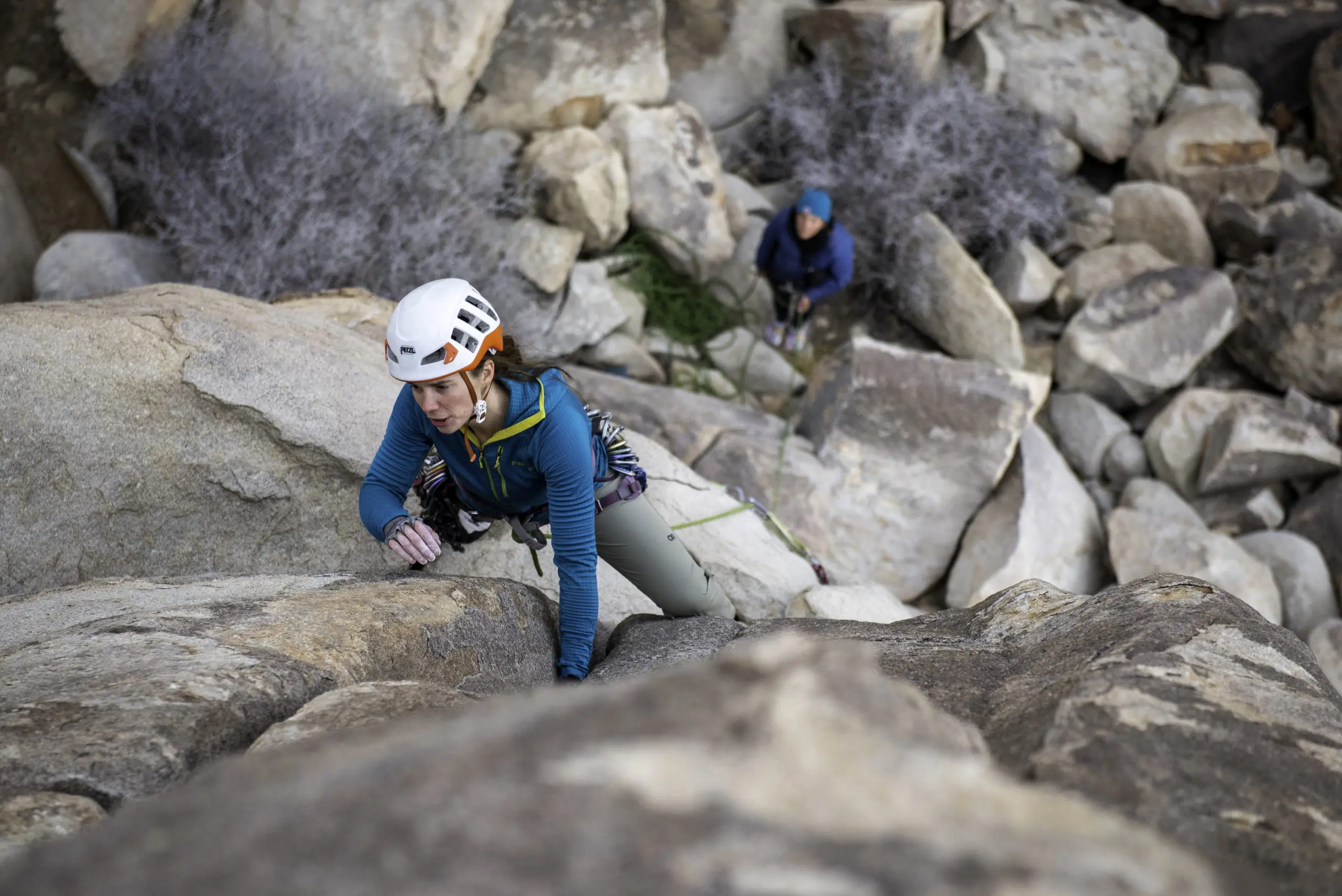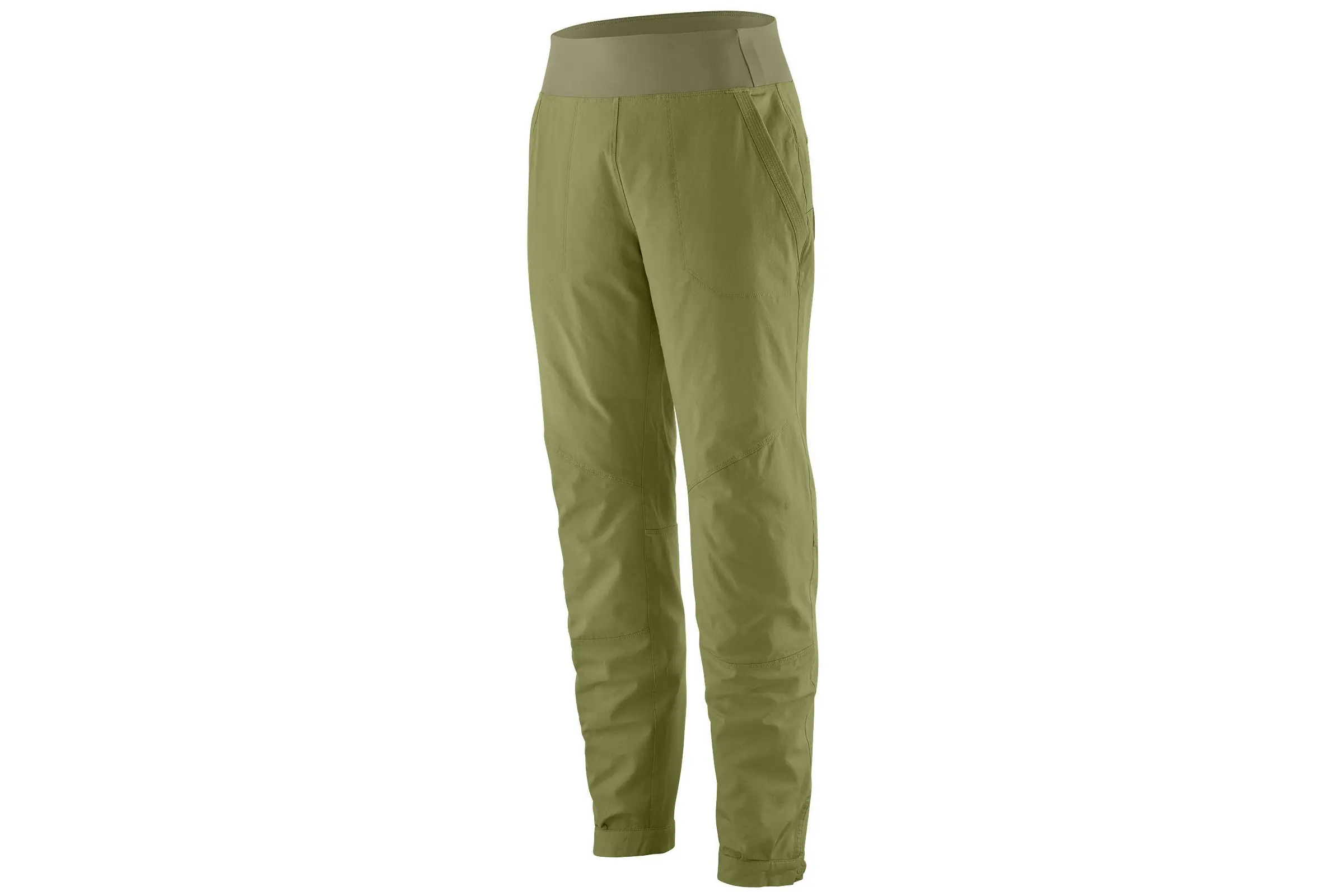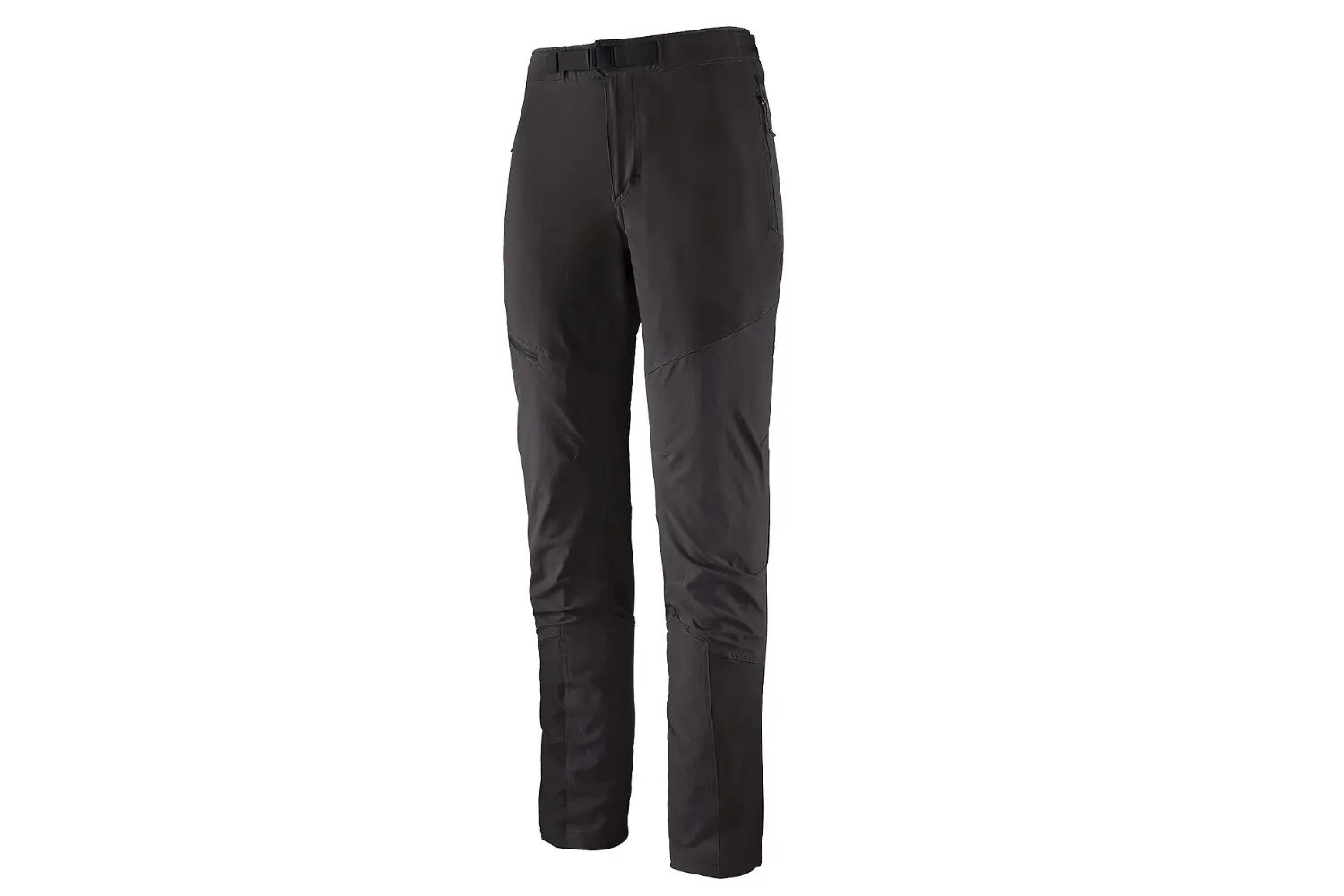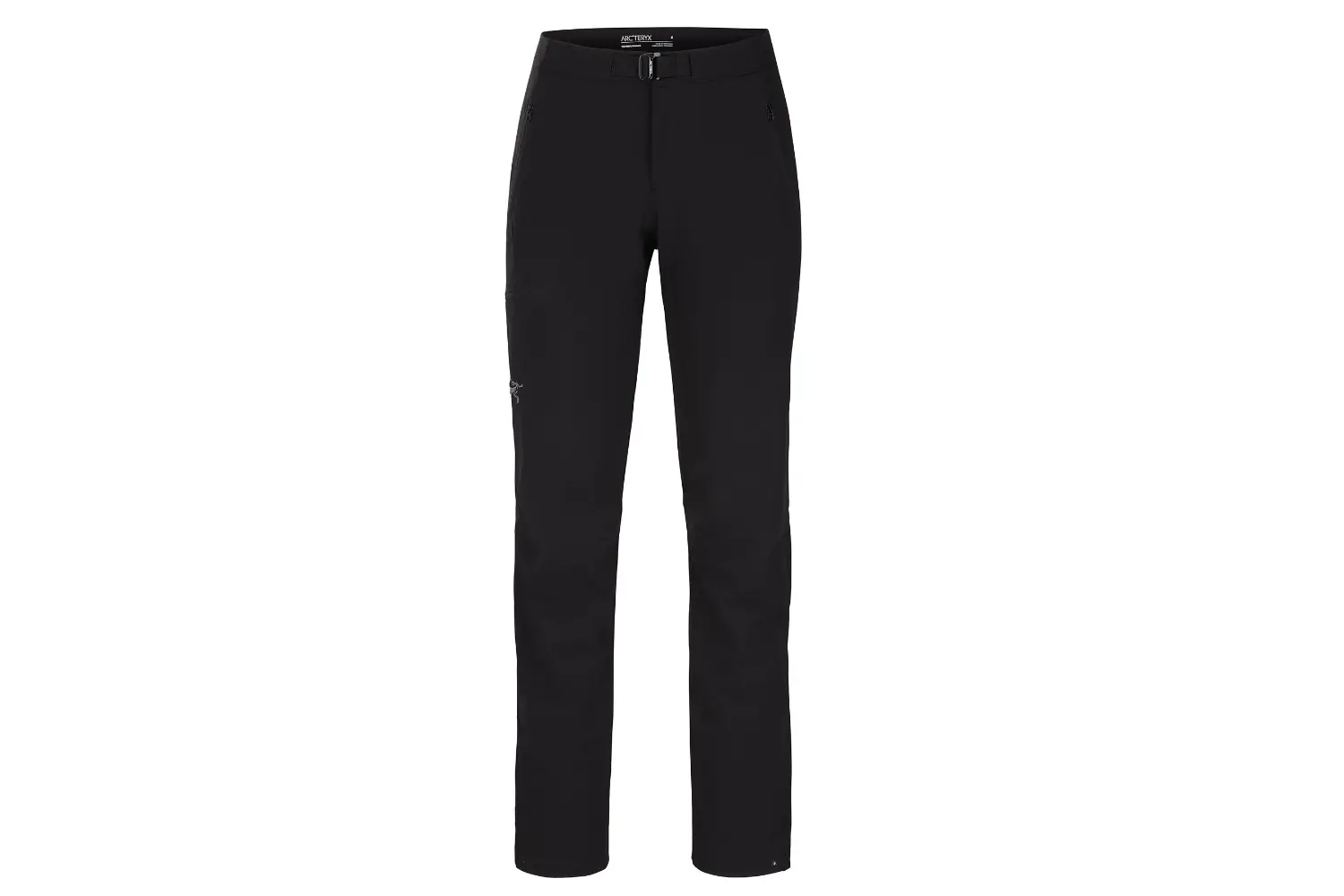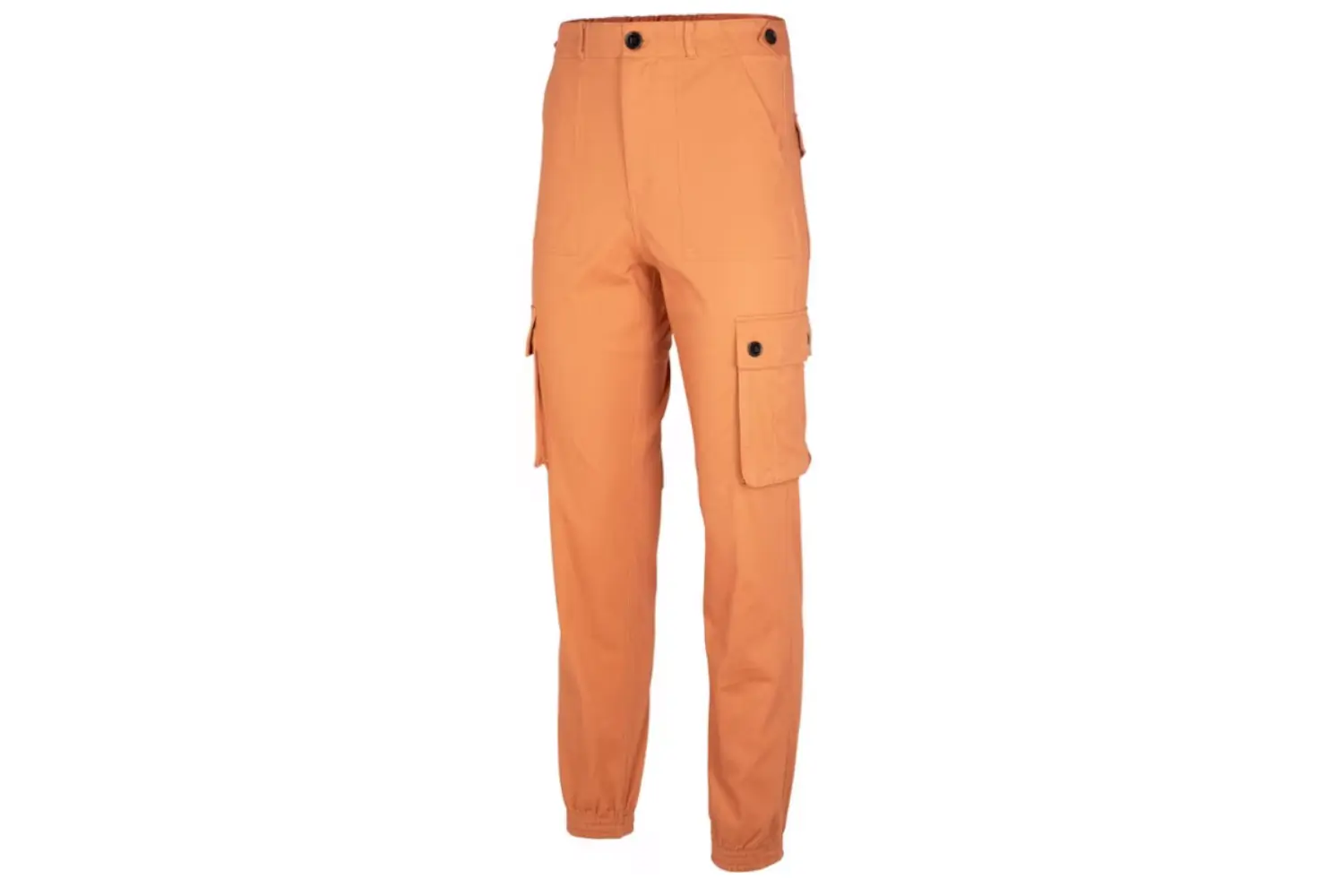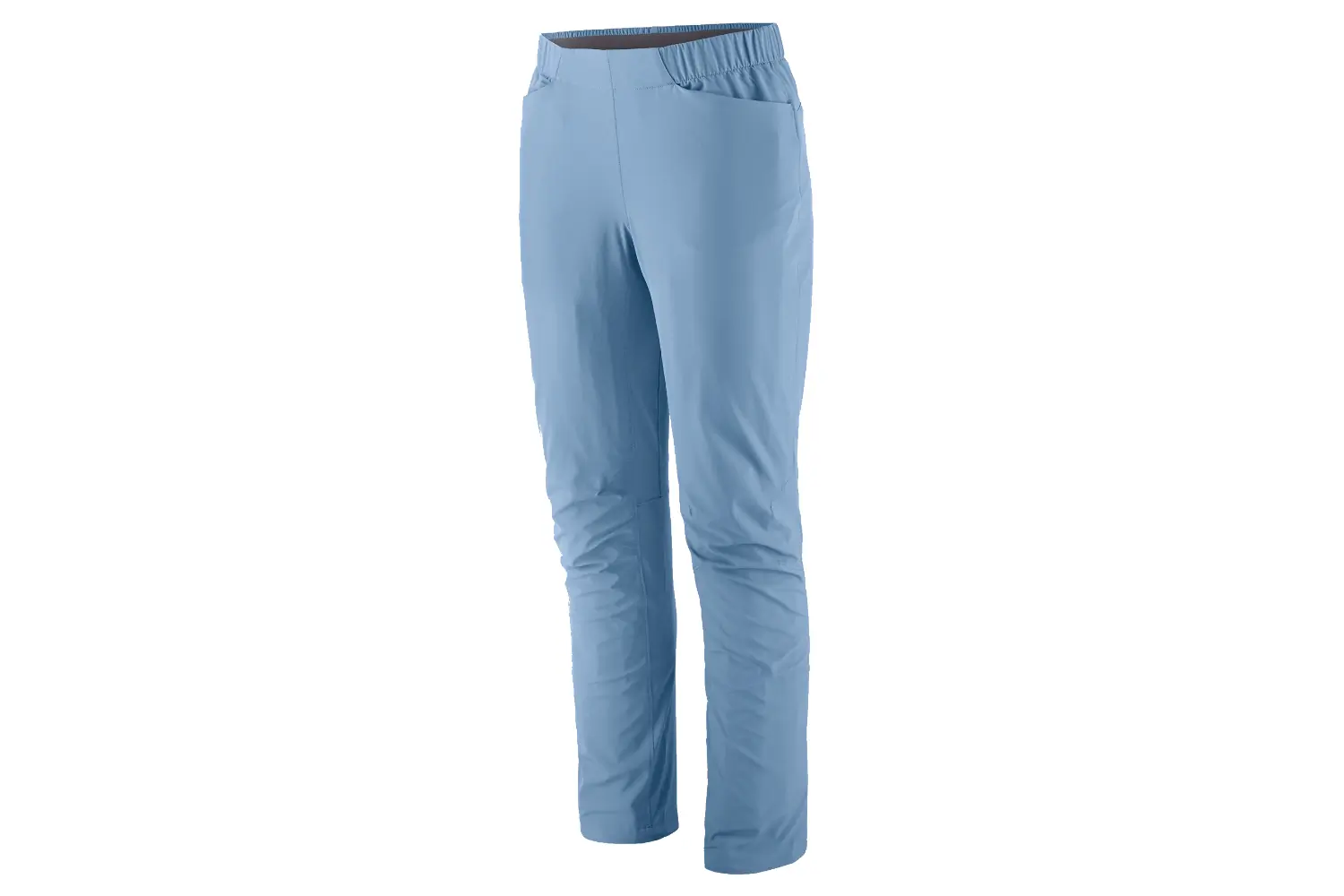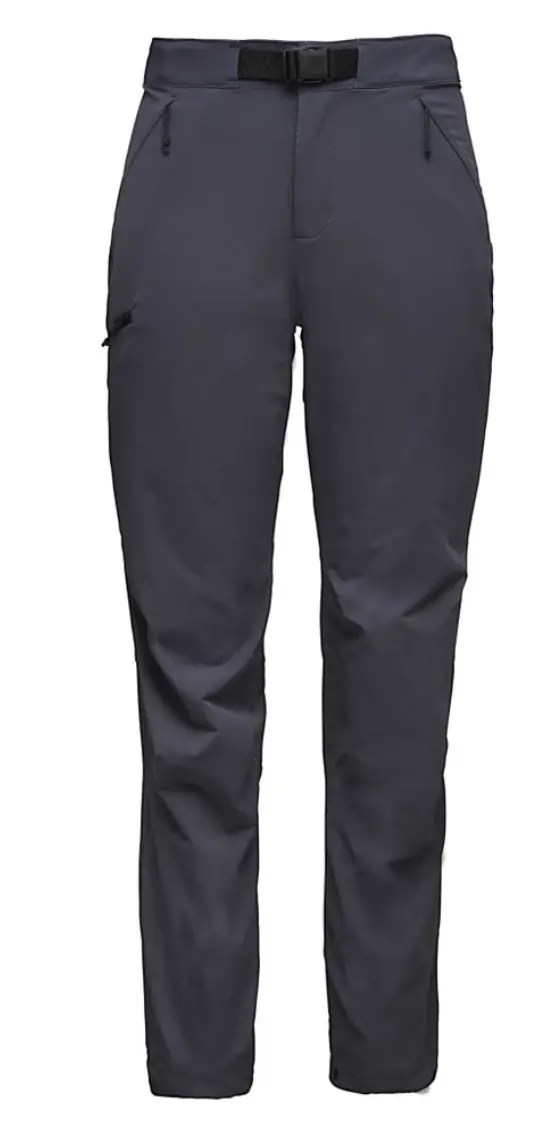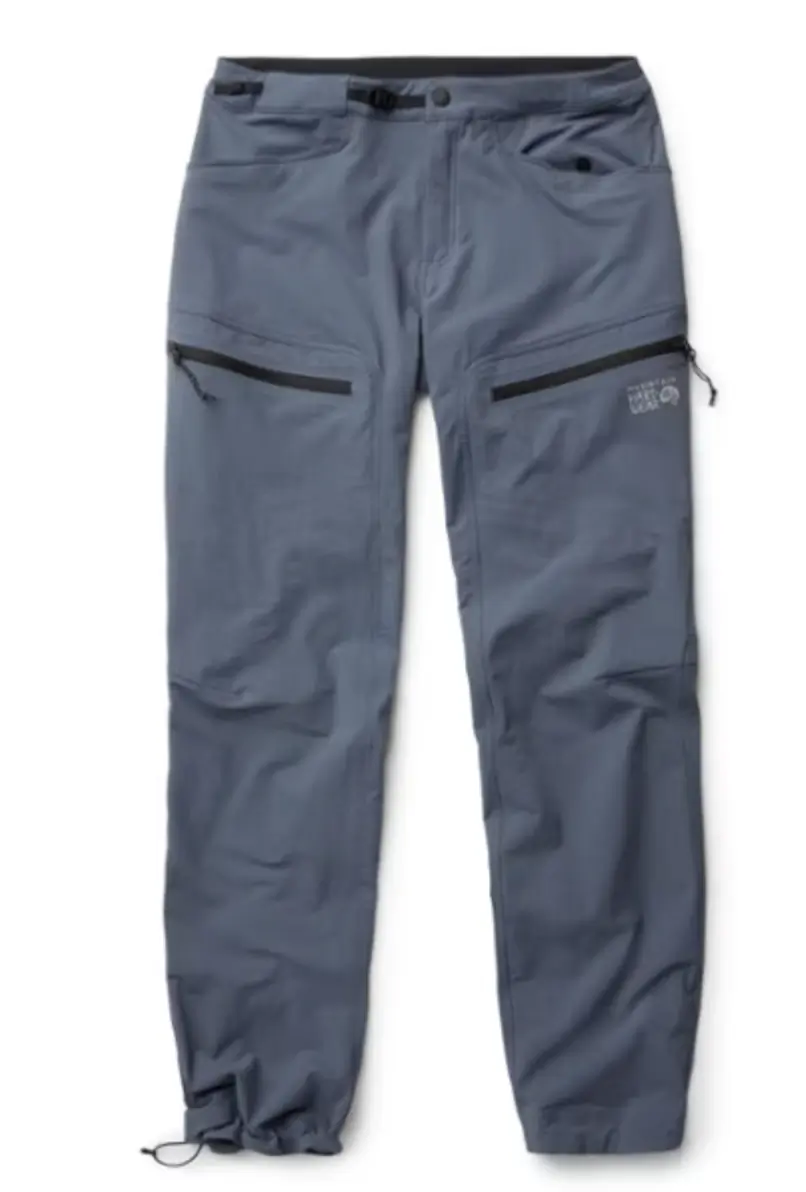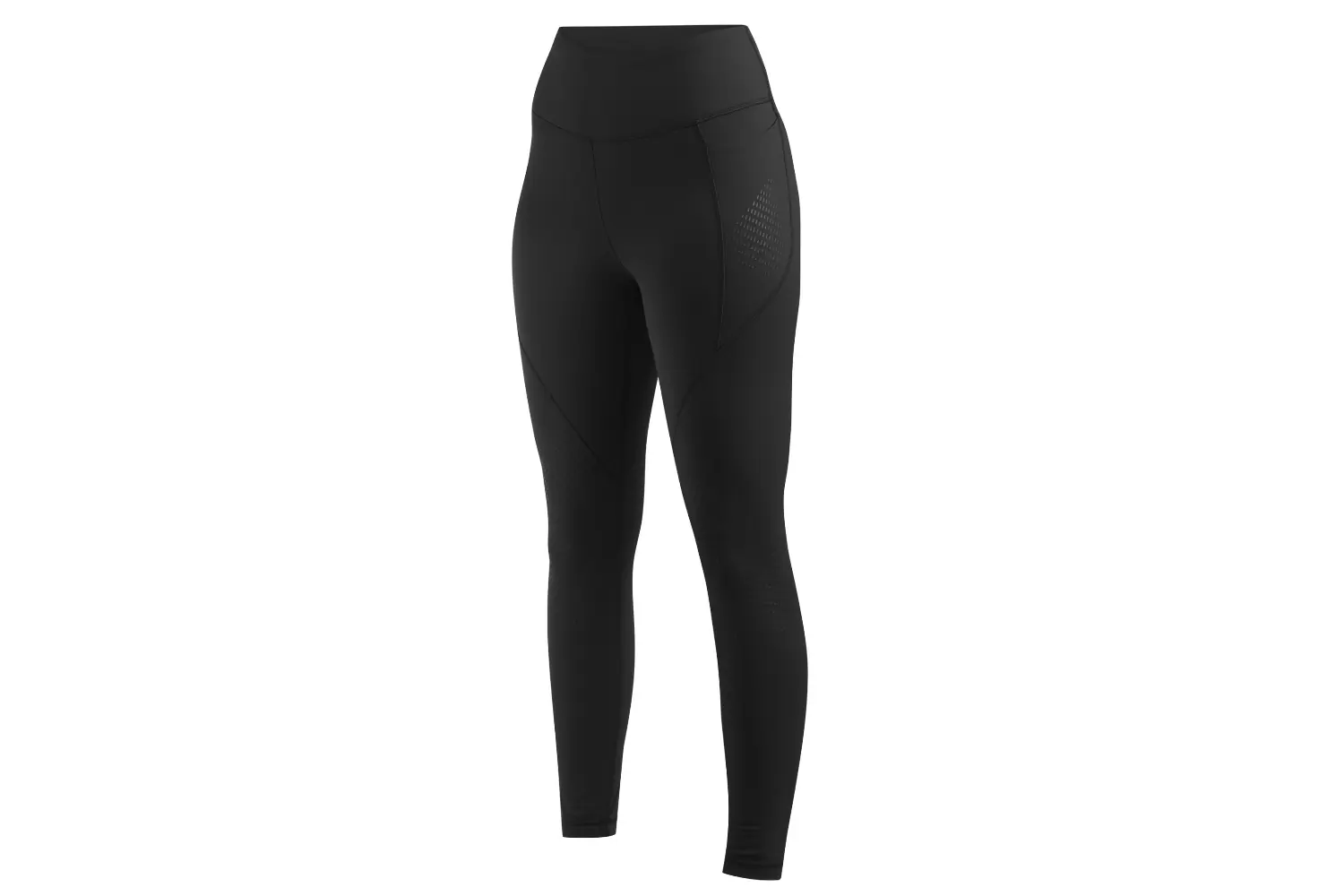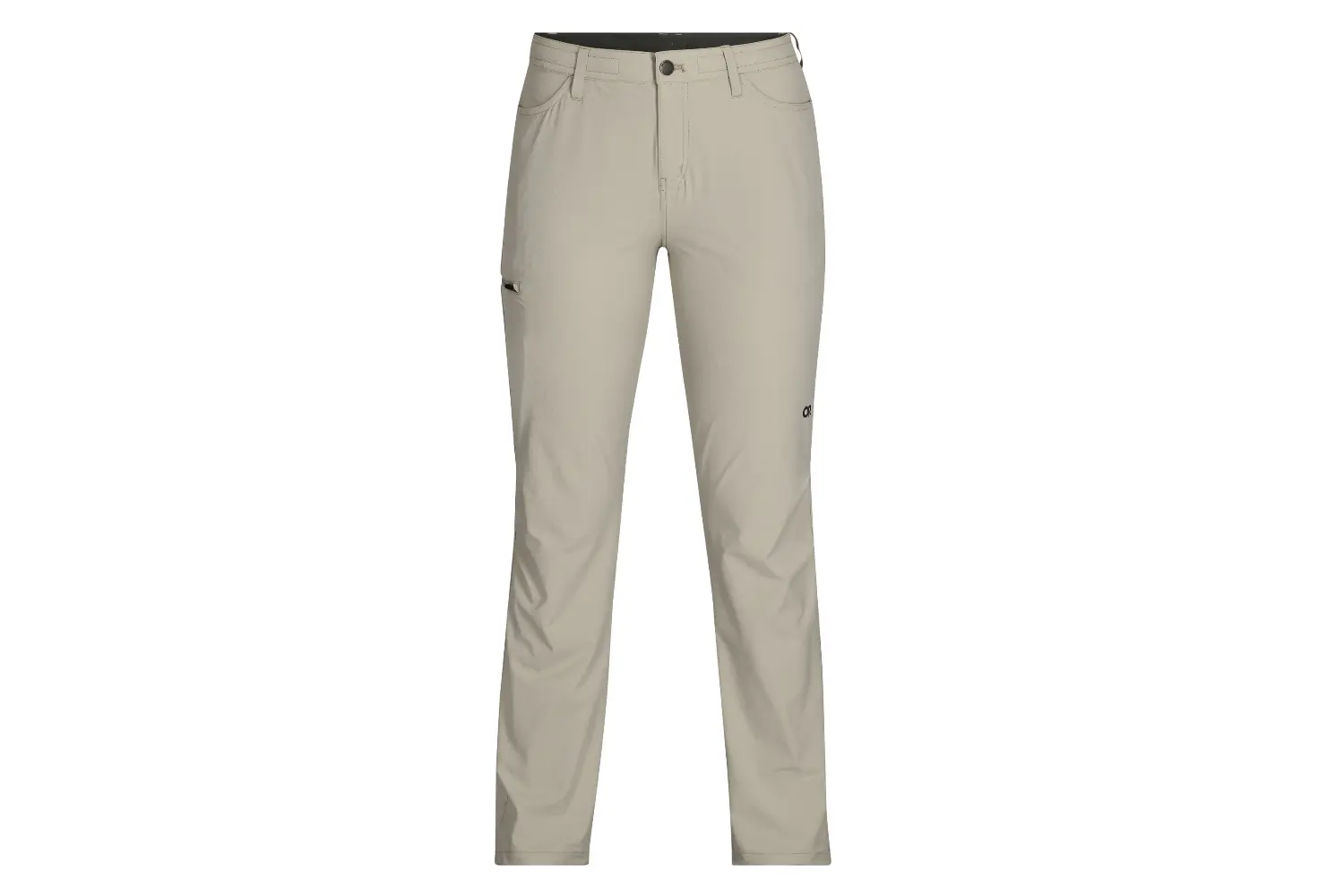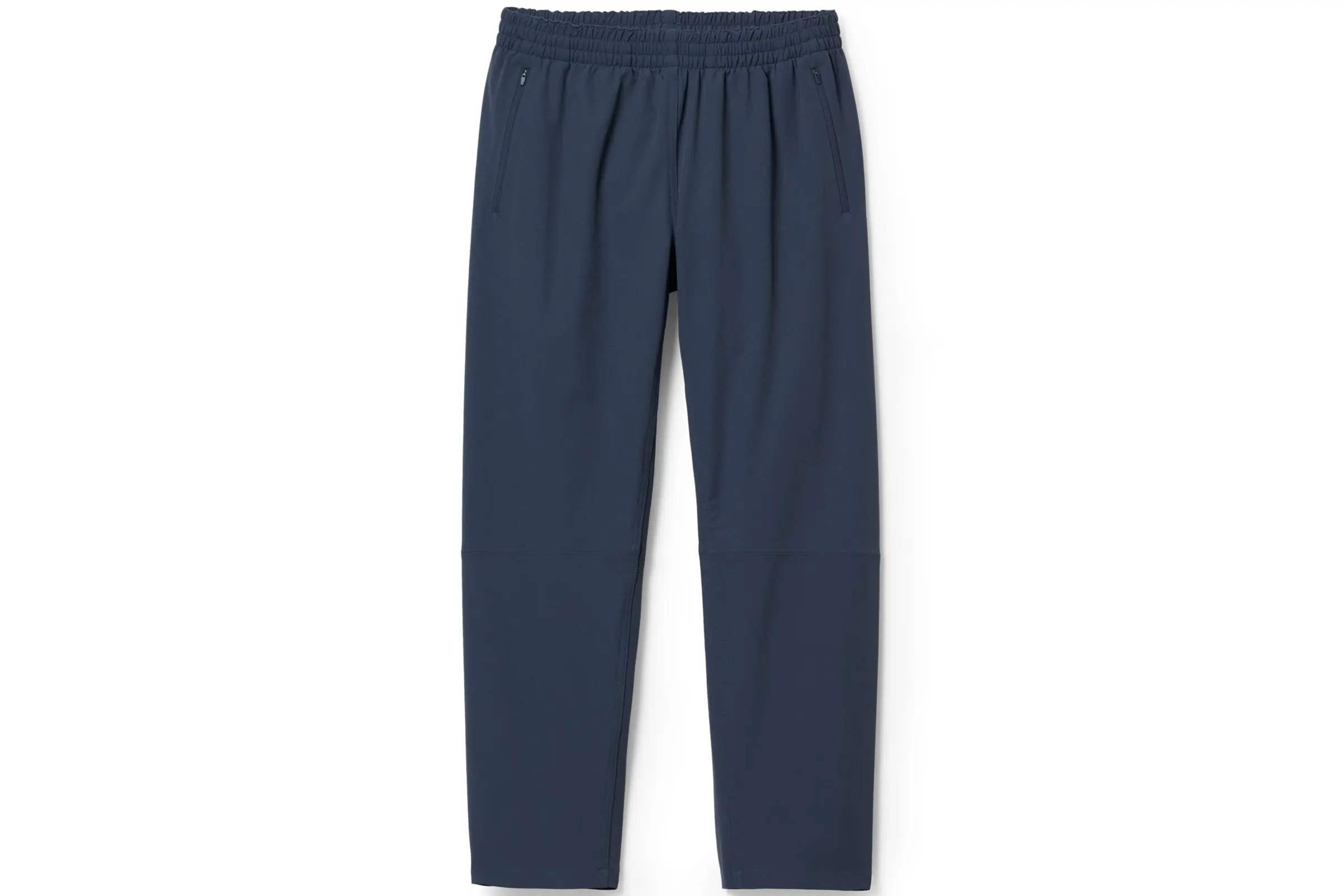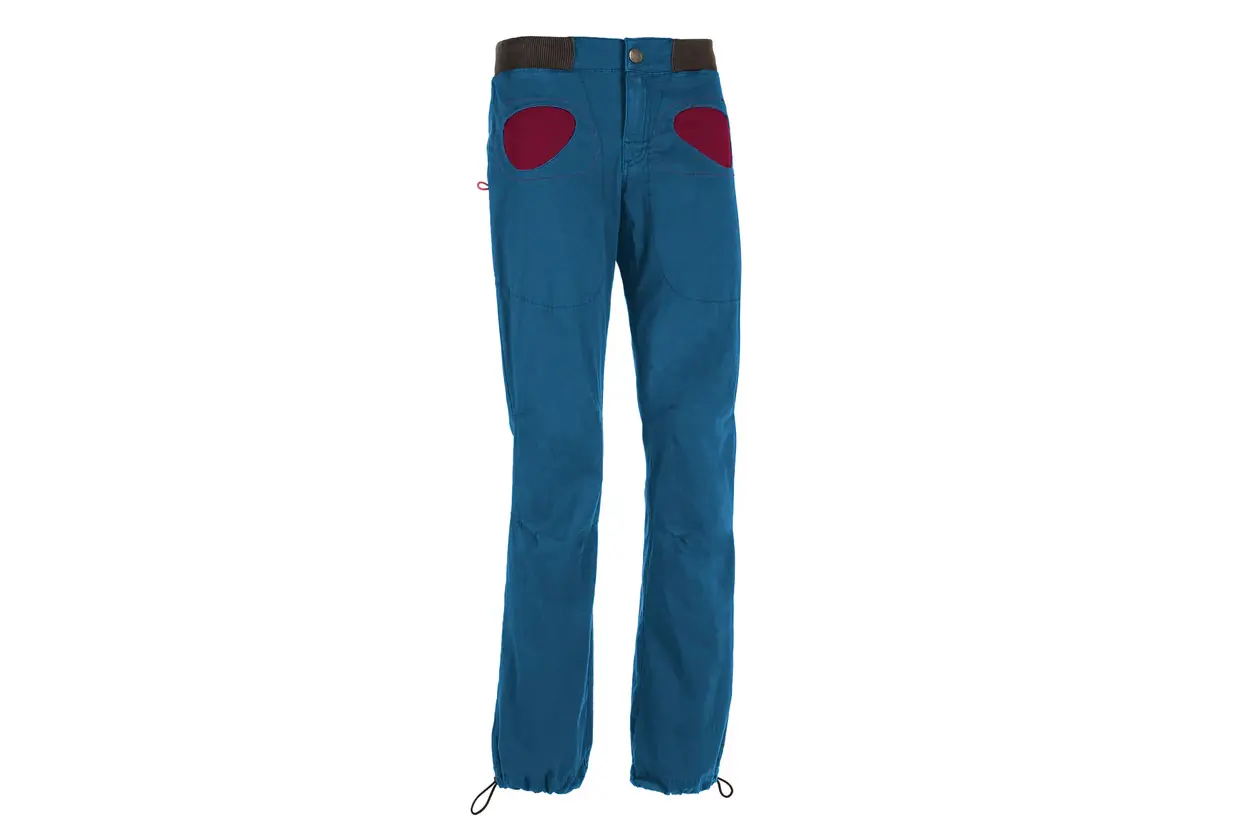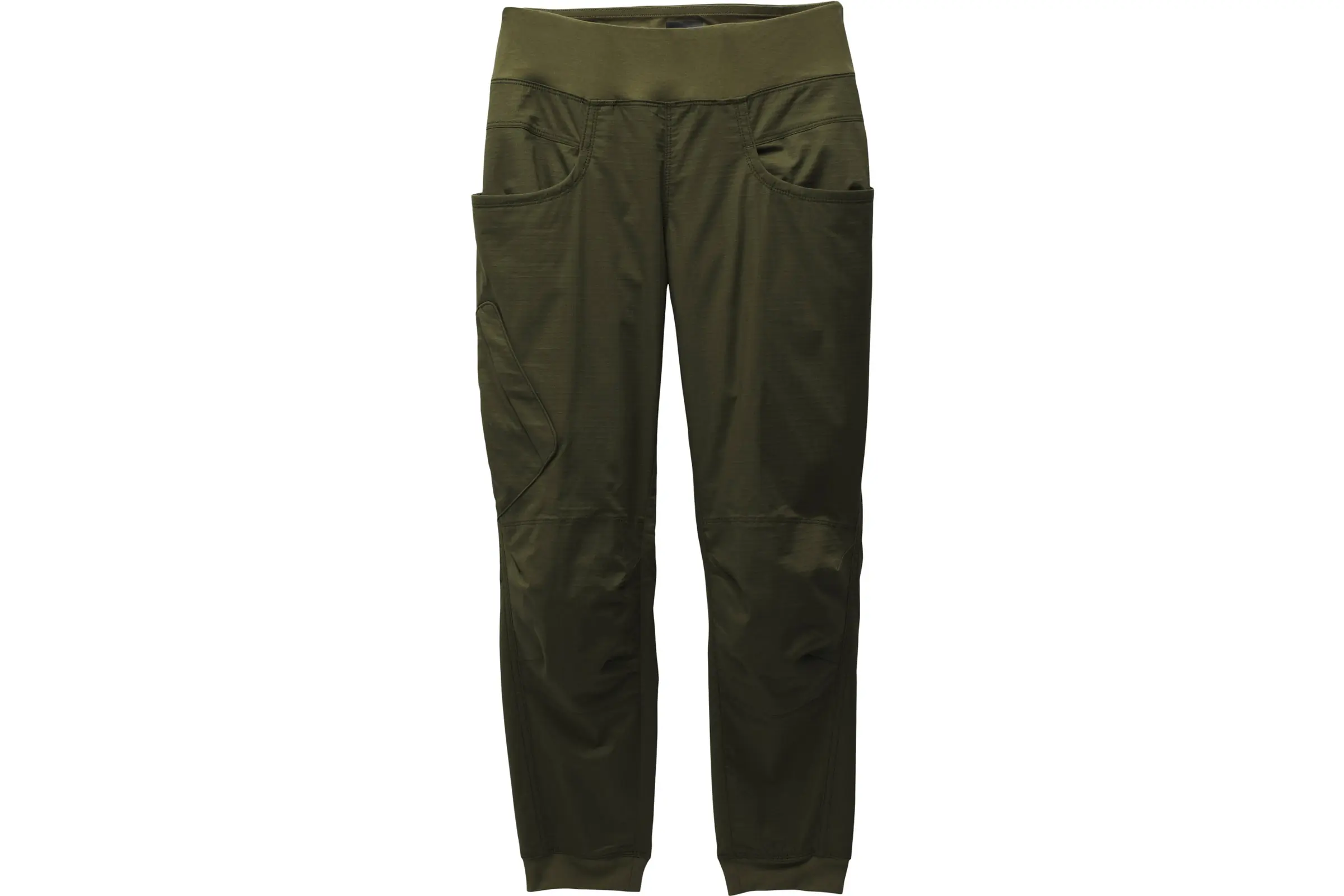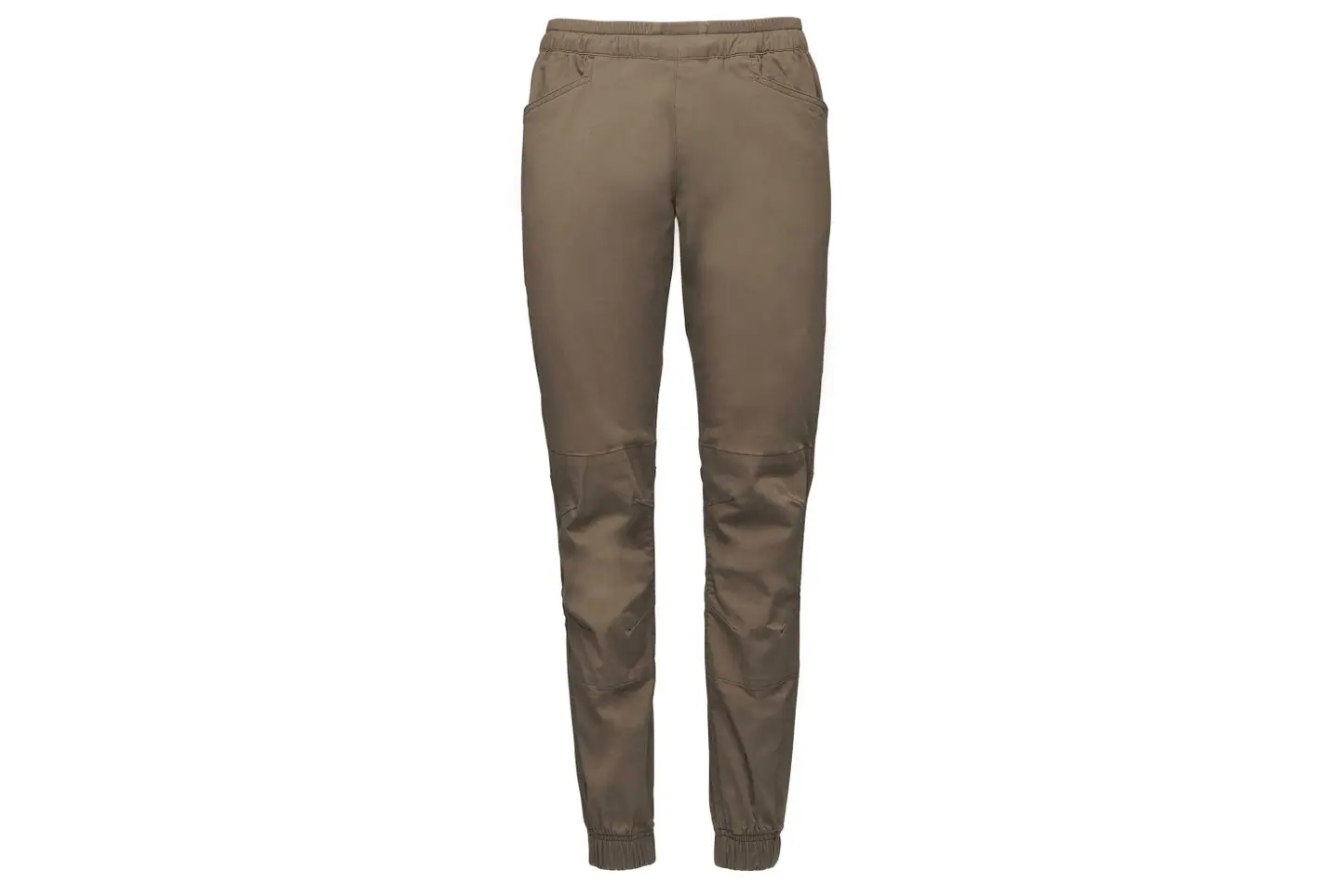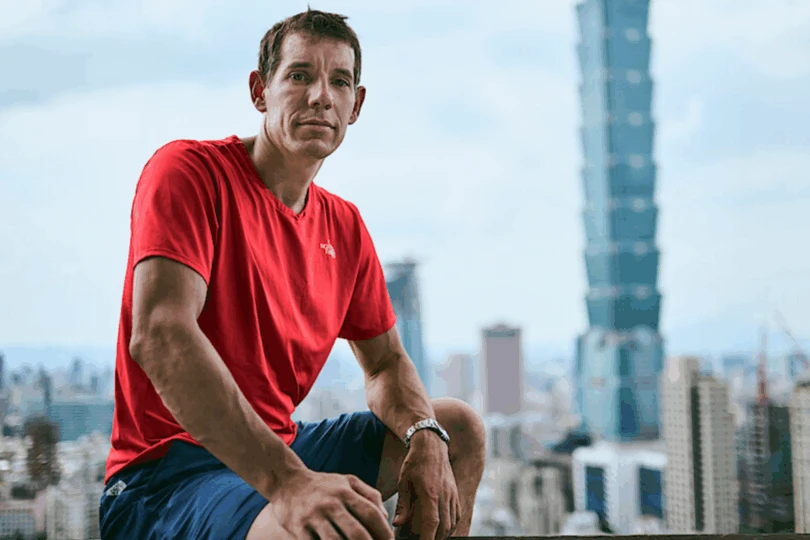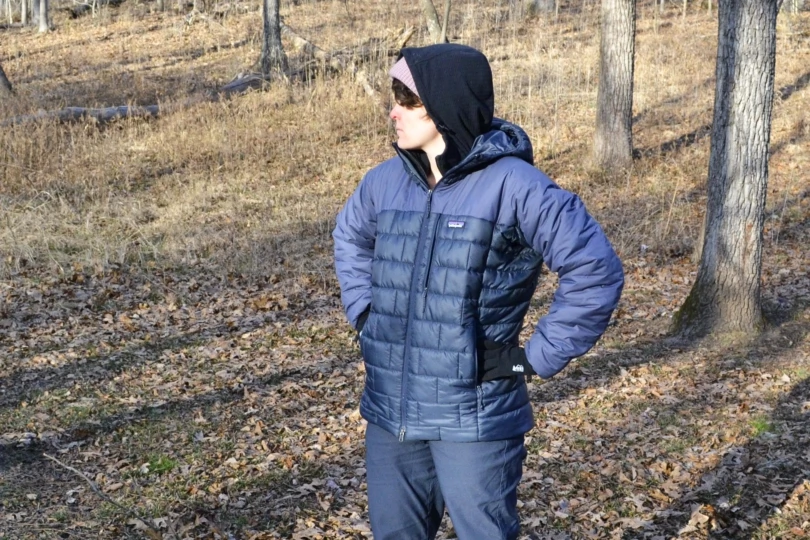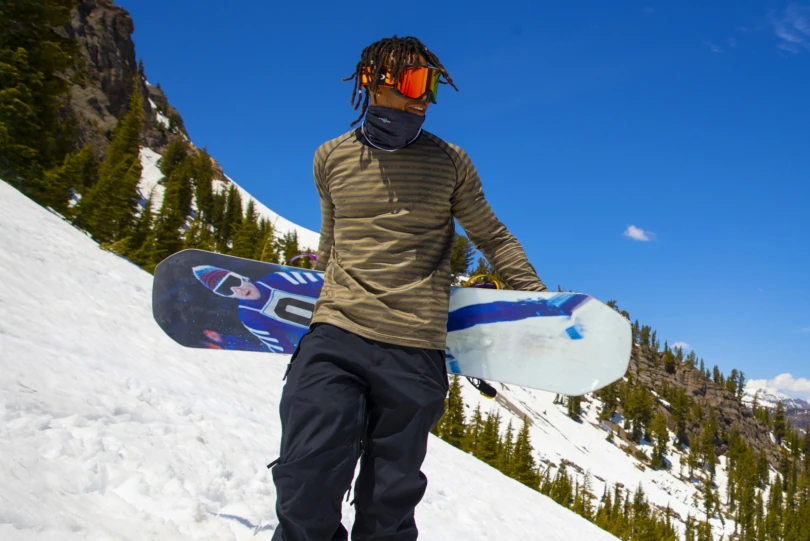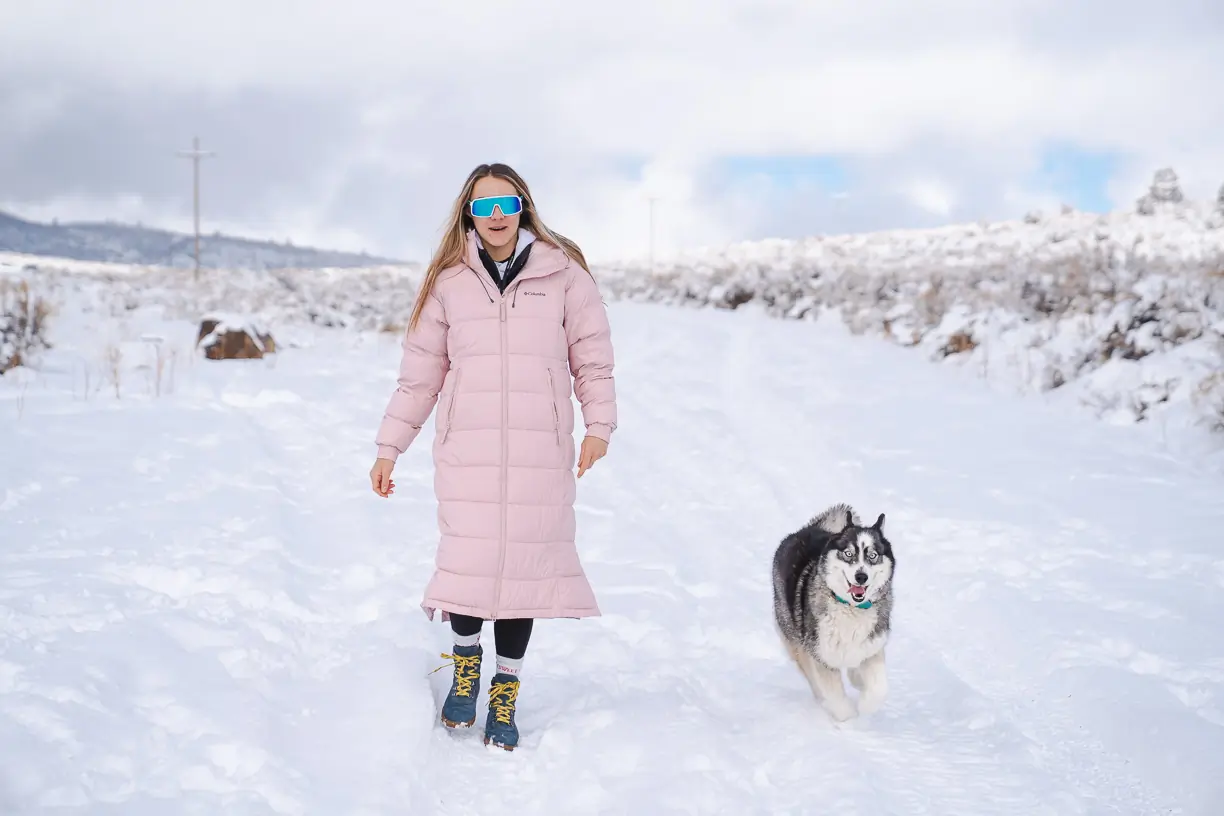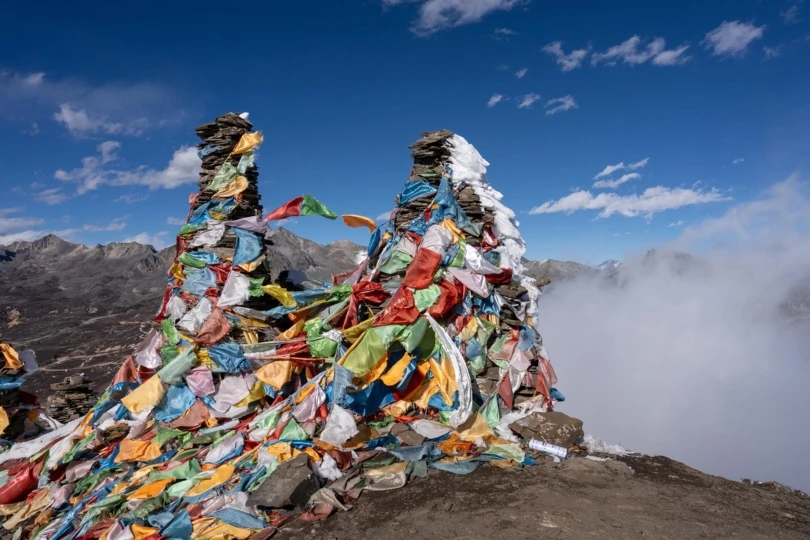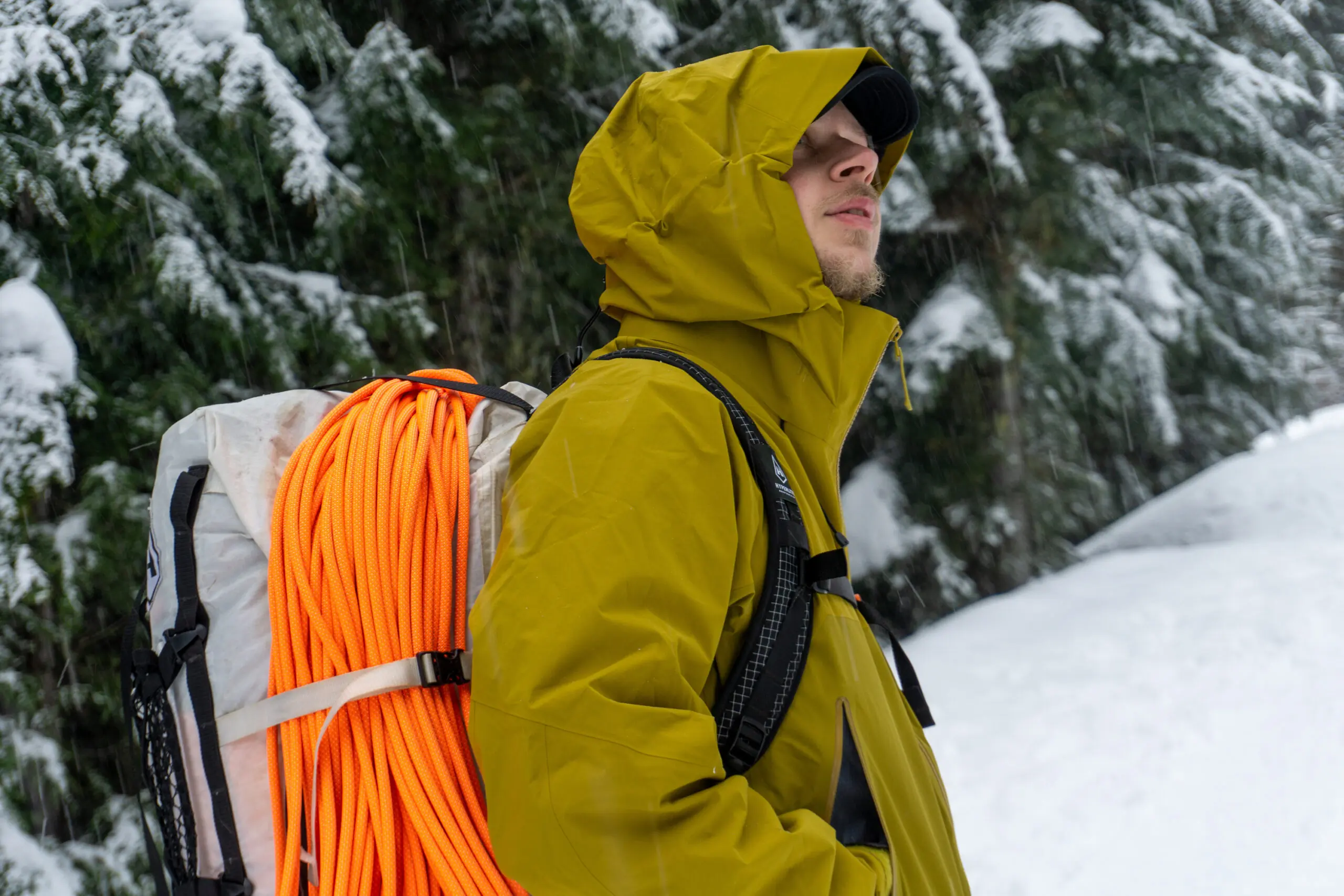Finding the best climbing pants can be a pain. Climbing demands a lot, and your clothing can make or break the experience. Women’s climbing pants need to allow full range of motion, endure heavy use, provide protection from the elements, and, let’s be honest, look good, too!
Since 2020, we’ve put 28 pairs of pants through the wringer, completing extensive field testing on each and every one. Our testing methods represent the diverse ways to participate in the sport. We have worn these pants on multi-pitch adventures in the Black Canyon of the Gunnison and Squamish, British Columbia. We’ve been humbled by the mind-boggling boulder problems of Joshua Tree, and we’ve even layered a couple of pairs over long johns to swing ice tools in Ouray.
On each day out, we’re always looking for the perfect pair of pants for the conditions. On a blustery day in the mountains, we need fabric that cuts the wind and sheds precipitation. When we’re giving our max effort on a project, we demand fit and design that allows for unencumbered movement. And if efficiency is our goal on a big route, special features like side zip pockets for quick access come in handy.
Whether you’re planning an epic climbing trip in the backcountry or working on a project at your local climbing gym, we have the pants for you. After spending months researching, testing, and geeking out on everything from the seams to the fabric stretch, we finally narrowed down the best women’s climbing pants of 2025.
Editor’s Note: We updated our climbing pants guide for “Sendtember” on August 27, 2024, rounding out our selection of alpine-centric pants with the Black Diamond Alpine pants and the Mountain Hardwear Chockstone Alpine Light pants. We’ve also added a price and value analysis to help you figure out what features you might not need and help you save a little money.
The Best Women’s Climbing Pants of 2025
Patagonia Caliza Rock Pant
- Weight: 12 oz.
- Material: 93% cotton, 7% spandex
- Number of pockets: Four
- Special features: Large, comfortable waistband
- Fit: Standard
Pros
- Impressive stretch
- High durability for long-lasting use
- Snap ankle closures for zero interference
- Comfortable enough to wear all day
Cons
- Front pockets don’t close
- Pockets are too shallow
The North Face Women’s Aphrodite 2.0 Capris
- Weight: Unavailable
- Material: 95% nylon, 5% elastane
- Number of pockets: Three
- Special features: Invisible-zip inside drop-in front pocket
- Fit: Standard; straight leg
Pros
- Invisible inside zip pocket
- Deep front pockets
- UPF 40+
- Flattering design
- Drawstring cord
Cons
- Restrictive waistband
- Inadequate water resistance
- Prone to snagging and pilling
Mountain Hardwear Women’s Dynama/2 Ankle
- Weight: 8.4 oz.
- Material: 94% nylon, 6% elastane
- Number of pockets: Four
- Special features: Secure zip pocket on the left thigh
- Fit: Standard; tapered leg
Pros
- Pocket that zipped for added security
- Incredibly lightweight
- Feminine look
- UPF 50
Cons
- Pockets unable to carry heavy items
Patagonia Terravia Alpine Pants
- Weight: 11.4 oz.
- Material: 86% recycled polyester in body, 14% spandex panels
- Number of pockets: Four
- Special features: Reinforced paneling in high-stressed areas for added durability
- Fit: Slim
Pros
- Has a built-in belt
- Great amount of stretch for mobility
- Cuffs adjust with shock cord and cord lock
- Secure, functional pockets that lie flat.
Cons
- The inseam may be too long for shorter legs
- Expensive
Arc’teryx Gamma Pants
- Weight: 10.4 oz.
- Material: 88% nylon, 12% elastane
- Number of pockets: Three
- Special features: All-zip pockets, gusseted crotch, DWR finish
- Fit: Slim; straight leg
Pros
- Excellent weather resistance
- Highly durable
- Great stretch
- Three zip pockets
Cons
- High price tag
Wondery Isabel 3.0 Pants
- Weight: Not available
- Material: 35% recycled cotton, 62% cotton, 3% spandex
- Number of pockets: 6
- Special features: 3 length options
- Fit: High-rise jogger
Pros
- Available in extended sizing (XXS-6XL)
- A variety of color options
- Plenty of pockets to store your snacks
Cons
- Lacking full range of motion
- Minimal weather resistance
Patagonia Chambeau Rock Pants
- Weight: 7.9 oz.
- Material: 87% recycled polyester, 13% spandex
- Number of pockets: Five
- Special features: DWR coating to shed light precipitation
- Fit: Slim; tapered leg
Pros
- Contoured waistband that adds comfort and functionality
- Perfect for staying cool while climbing
- Adjustable cuffs
Cons
- Pricier than others
- Drop-in pockets not useful
- Weight: Unavailable
- Material: 85% nylon, 15% elastane
- Number of pockets: 3
- Special features: DWR finish
- Fit: Slim
Pros
- Strong weather resistance
- Large zip pockets
- PFC-free DWR finish
Cons
- Belt buckle a little bulky
- Too heavy for the hottest days
- Weight: 8.3 oz.
- Material: 74% nylon, 16% Lycra
- Number of pockets: Two
- Special features: DuraPrint technology for abrasion resistance in high-use areas
- Fit: Form-fitting
Pros
- Waistband stays in place during activity
- High range of motion
- UPF 30
Cons
- Some pilling on seams after climbing on coarse rock
- Weight: Unavailable
- Material: 95% recycled nylon, 5% elastane
- Number of pockets: Five
- Special features: Gusseted crotch for ventilation
- Fit: Standard; straight leg
Pros
- Phone pocket on mid-thigh
- Cross-functional design for various activities
- Durable water repellent
- UPF 50
Cons
- No drawstring ankle ties or snaps
- Tendency to bunch up in the front
- Pricey
- Weight: 8.9 oz.
- Material: 86% nylon, 14% spandex
- Number of pockets: Five
- Special features: UPF 50+ rating
- Fit: Standard; straight leg
Pros
- Bluesign approved fabric
- Great mobility and stretch
- Highly breathable
- UPF 50+
Cons
- Less durable than other softshell pants
- Weight: Not available
- Material: 90% nylon, 10% elastane
- Number of pockets: 3
- Special features: Zippered hand pockets
- Fit: Roomy, mid-rise
Pros
- Super comfy
- Highly stretchy fabric allows for full range of motion
- Zip pockets to secure chapstick or snacks
Cons
- Fabric may be a bit heavy during warm weather
- Weight: Not available
- Material: 98% cotton, 2% elastane
- Number of pockets: 3
- Special features: Elastic brush loops on each pocket
- Fit: Regular
Pros
- Fun color combinations
- Good stretch
- Comfortable elastic waistband
Cons
- Minimal weather resistance
- Weight: Unavailable
- Material: 58% organic cotton, 39% recycled polyester, 3% elastane
- Number of pockets: Five
- Special features: Reinforced fabric at knees adds extra protection and durability
- Fit: Standard; jogger
Pros
- Abrasion resistance for durability
- Cuffed legs that are flattering and won’t get in the way
- Plenty of pockets
Cons
- Lacks waist drawstring for staying power
- Weight: 11.4 oz.
- Material: 98% organic cotton, 2% elastane
- Number of pockets: Four
- Special features: Go-to pant beyond climbing.
- Fit: Standard; jogger
Pros
- Elastic waistband and cuffs
- All-around comfort
- Perfect for multiple activities
Cons
- Material isn’t breathable
Women’s Climbing Pants Comparison Chart
| Women’s Climbing Pants | Price | Weight | Material | Pockets | Special Features | Fit |
|---|---|---|---|---|---|---|
| Patagonia Caliza Rock Pant | $109 | 12 oz. | 93% cotton, 7% spandex | 4 | Large, comfortable waistband | Standard |
| The North Face Women’s Aphrodite 2.0 Capris | $60 | Unavailable | 95% nylon, 5% elastane | 3 | Invisible-zip inside drop-in front pocket | Standard; straight leg |
| Mountain Hardwear Women’s Dynama/2 Ankle | $85 | 8.4 oz. | 94% nylon, 6% elastane | 4 | Secure zip pocket on the left thigh | Standard; tapered leg |
| Patagonia Terravia Alpine Pants | $149 | 11.4 oz. | 86% polyester, 14% spandex | 4 | Reinforced paneling in high-stressed areas for added durability | Slim |
| Arc’teryx Gamma Pants | $200 | 10.4 oz. | 88% nylon, 12% elastane | 3 | All-zip pockets, gusseted crotch, DWR finish | Slim; straight leg |
| Wondery Isabel 3.0 Pants | $110 | Unavailable | 35% recycled cotton, 62% cotton, 3% spandex | 6 | 3 length options | High-rise jogger |
| Black Diamond Alpine Pants | $150 | Unavailable | 85% nylon, 15% elastane | 3 | DWR finish | Slim |
| Mountain Hardwear Chockstone Pants | $150 | 11.5 oz. | 88% nylon, 12% elastane | 3 | Cuff cinches with lace hooks | Slim |
| Patagonia Chambeau Rock Pants | $129 | 7.9 oz. | 87% polyester, 13% spandex | Five | DWR coating to shed light precipitation | Slim; tapered leg |
| Outdoor Research Ad-Vantage Leggings | $99 | 8.3 oz. | 74% nylon, 16% Lycra | Two | DuraPrint technology for abrasion resistance in high-use areas | Form-fitting |
| prAna Halle Straight Pant II | $95 | Unavailable | 95% nylon, 5% elastane | Five | Gusseted crotch for ventilation | Standard; straight leg |
| Outdoor Research Ferrosi Pants | $99 | 8.9 oz. | 86% nylon, 14% spandex | Five | UPF 50+ rating | Standard; straight leg |
| Outdoor Voices RecTrek Pants | $98 | Unavailable | 90% nylon, 10% elastane | Three | Zippered hand pockets | Roomy, mid-rise |
| E9 Onda Story Pants | $118 | Unavailable | 98% cotton, 2% elastane | Three | Elastic brush loops on each pocket | Regular |
| prAna Kanab Ripstop Pants | $95 | Unavailable | 58% organic cotton, 39% recycled polyester, 3% elastane | Five | Reinforced fabric at knees adds extra protection and durability | Standard; jogger |
| Black Diamond Notion | $95 | 11.4 oz. | 98% cotton, 2% elastane | Four | Go to pant for beyond climbing | Standard; jogger |
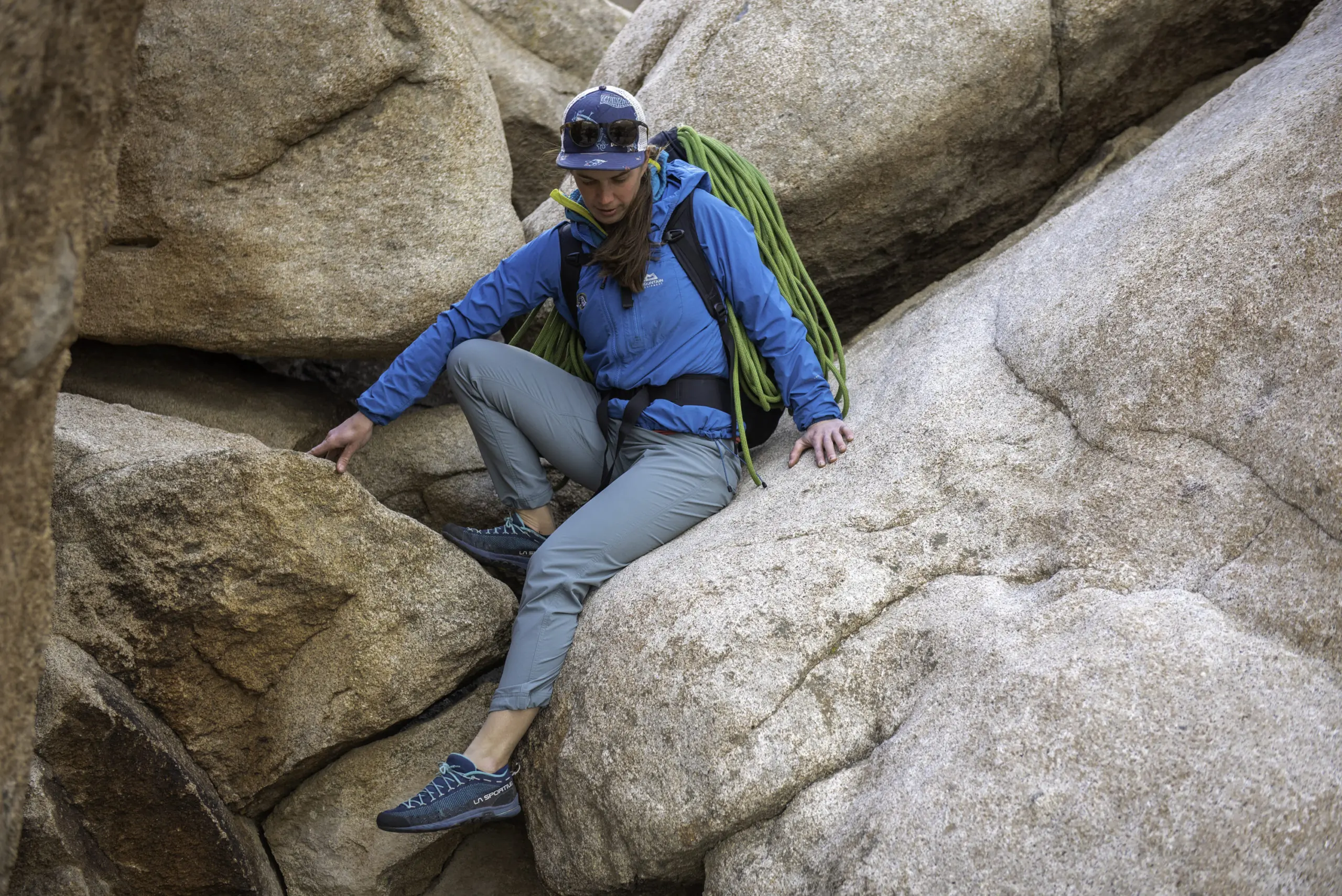
How We Tested Women’s Climbing Pants
The team at GearJunkie are outdoor experts and enthusiasts. Our ranks include alpinists, mountaineers, crag rats, purely indoor climbers, and everything in between. On a rolling basis, we put climbing pants to the test, specifically looking at functionality, durability, and comfort to narrow down the best climbing pants available today.
Contributor Katie Griffith goes through climbing pants like it’s her job, and it is. As a professional rock climbing guide, she is always searching for the perfect gear to make up her daily uniform. Katie regularly spends over 110 days a year guiding in the field, and that’s not counting any of her personal climbing days or training. She is pursuing the Rock Guide certification through the AMGA and recently passed her Aspirant Exam to become an AMGA Assistant Rock Guide.
Her guiding and personal climbing is varied, and she looks for different features to accommodate the diverse disciplines of the sport. She spends most of the fall, winter, and spring in the desert, guiding in Joshua Tree. During the summer she travels north to work as an alpine climbing guide in the Cascades. Throughout the seasons she dabbles in bouldering and ice climbing, in addition to pursuing personal trad and alpine goals.
The coarse granite and spiky plants of Joshua Tree quickly shred clothing, so her kit needs to include highly durable fabrics. When heading into the mountains, weather-resistant, soft shells to cut wind and precipitation are key. If she’s bouldering or sport climbing, comfort and range of motion are top priorities, so pants with high-stretch materials are her go-to. Depending on the activity, features like zip pockets may come in handy, too.
From desert cragging to alpine climbing to garage-wall bouldering, Katie pursues all types of climbing, all year round. She’s tested these pants in diverse climbing disciplines to give you her best recommendations for your style.
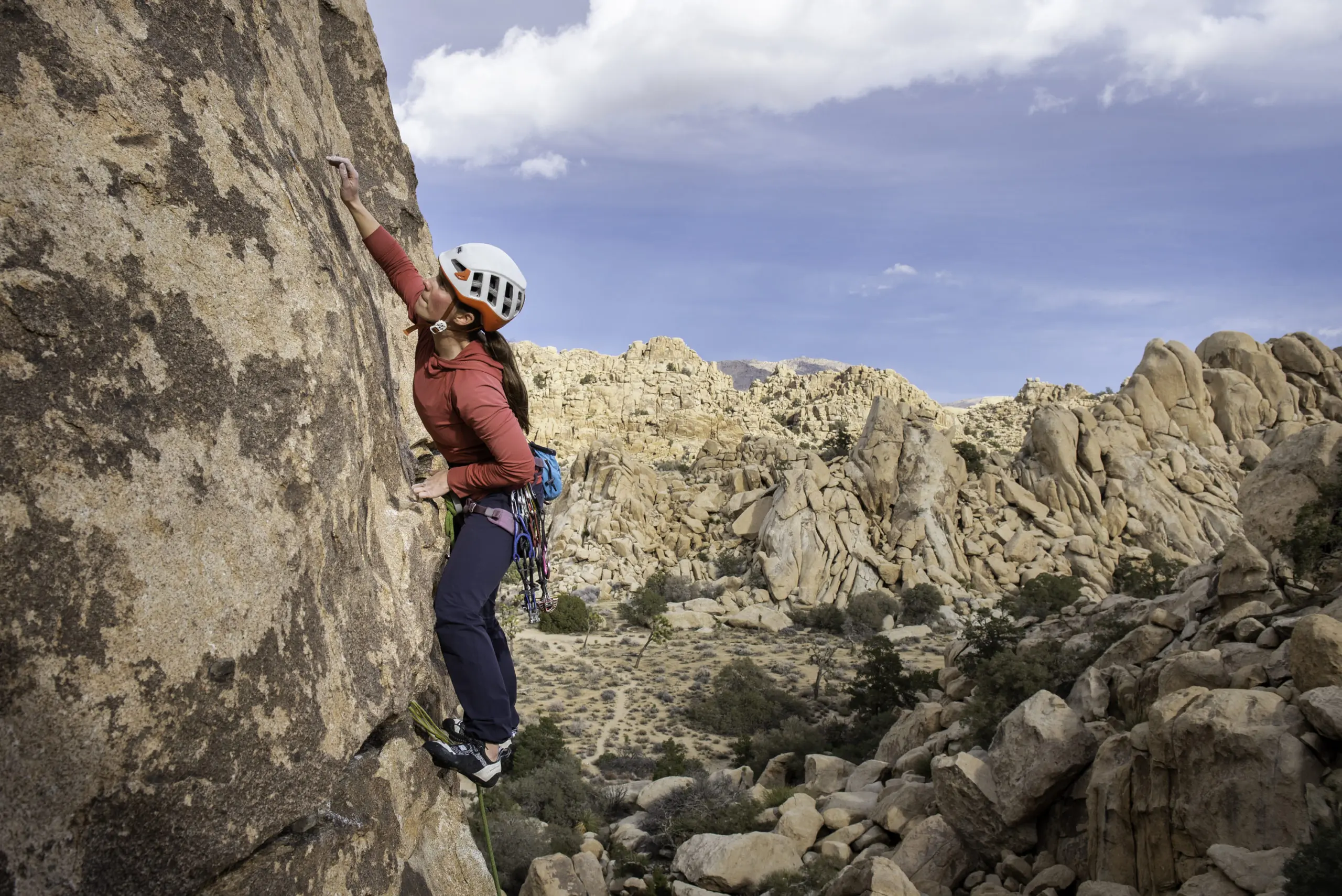



Buyer’s Guide: How to Choose the Best Climbing Pants
First, take a few moments to imagine your climbing habits. Do you plan to mostly use these pants climbing indoors or in the elements? If outside, will it normally be hot and muggy or cool and breezy? Do you prefer body-hugging clothing or a bit more room?
There’s no right or wrong answer, but having a clear idea of how you’ll use these pants will help determine the best option. For more guidance on choosing the best climbing pants for your needs, keep reading to understand the functions that differentiate them from non-climbing pants.
Identify Your Climbing Style
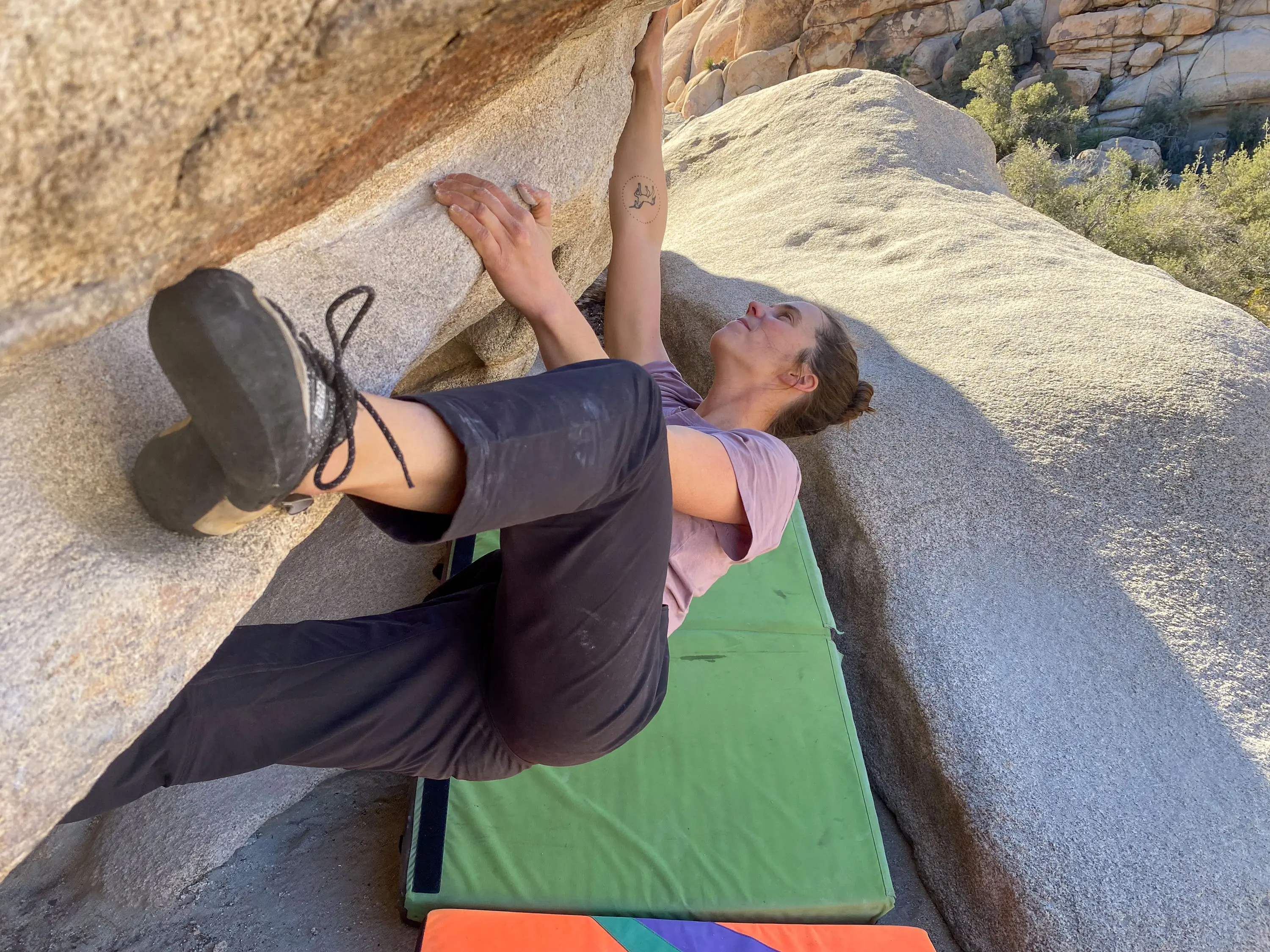



One of our favorite things about climbing is that there are so many ways to participate. Maybe you dig getting deep in the mountains, climbing remote peaks in the backcountry. Or perhaps you prefer staying closer to the ground, puzzling out cryptic sequences with your crew. Depending on your style, the demands you put on your clothing will vary, requiring different features.
When weather conditions are a factor, you’ll want materials that shed moisture and cut the wind. Softshell pants, like the Arc’teryx Gamma, typically provide weather protection for alpine climbing, ice climbing, and mountaineering. Some come with a Durable Water Repellent (DWR) coating, which causes moisture to bead and run off of the fabric. Softshells are also available with different levels of insulation, so you can further fine-tune your kit for the conditions.
Your pants will take a beating when trad and crack climbing on coarse rock. In crack climbing areas like Joshua Tree, Vedavoo, or Moab, durability is essential. Not only will your pants last longer, but heavier-weight fabrics can also protect your skin from abrasion while you shove your knees into offwidth cracks or scum your hips against the sides of chimneys.
If your goal is to try hard on your project, range of motion and comfort are key, whether you’re clipping bolts or pebble-wrestling. We look for high-stretch materials and a fine-tuned fit, so we can move with ease. When the weather is toasty, breathable, lightweight options, like the Mountain Hardwear Dynama/2 Ankle pants, can also increase comfort and improve performance.
Any comfortable pants can work for indoor climbing and casual cragging. If you’re just getting into climbing and are overwhelmed by mounting gear costs, there’s no need to shell out for highly technical pants. Leggings, hiking pants, and other multi-purpose pants like the Aphrodite 2.0 Capris from The North Face will all work great.
Climbing Pant Materials
Climbing pants are often a blend of synthetics, sometimes cotton, and typically elastane (sometimes called spandex). The higher percentage of elastane, the more stretch the pants will have.
The added stretch will also result in a more skintight feel, much like the Outdoor Research Ad-Vantage Leggings with their impressive stretch capabilities (16% Lycra).
It’s not only the amount of elastane that makes climbing pants outperform regular pants. Other essential factors include breathability, reinforced areas that add durability, and design that allows fluid mobility, like the Patagonia Terravia Alpine Pants. A decent amount of stretch allows climbers to high-step, stem, and heel hook without restriction.
Other factors, like moisture-wicking properties, sun protection, and the ability to dry quickly, are not vital for indoor climbing. However, they are necessary for long, strenuous alpine or multi-pitch climbs.
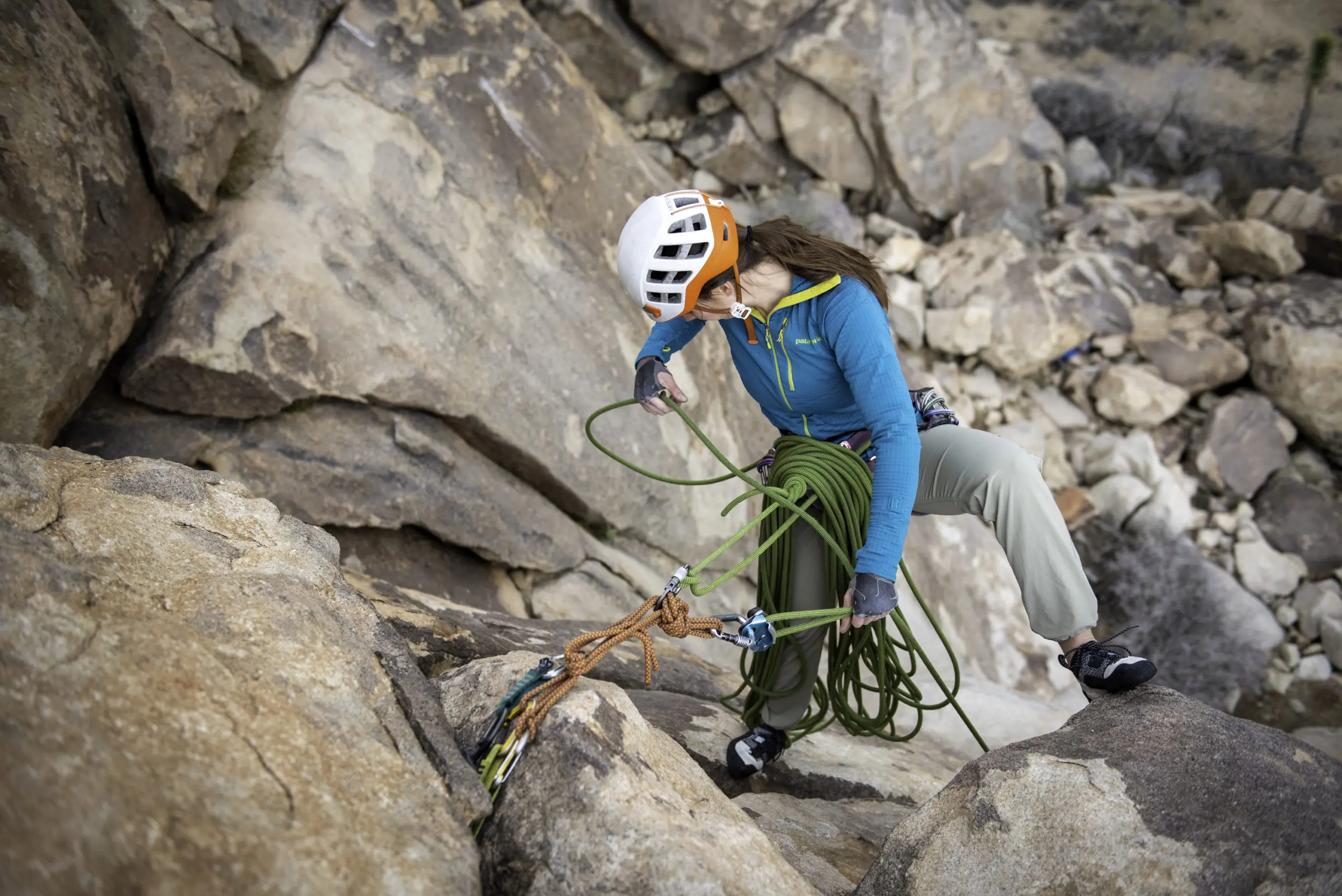



Fit
There are a few things to consider when finding the right fit for climbing pants. A loose-fitting pant provides a comfortable, relaxed feel designed for maximum movement. However, the material often tends to be heavier.
If the pants are too loose and flowy, they can obscure your vision for when you need to hone in on technical footwork. On the other hand, tight-fitting pants like leggings and tights allow total freedom without feeling weighed down.
The downside to a tight fit is less durability against abrasions. Tight, thin leggings don’t provide as much buffer between your skin and the rock.
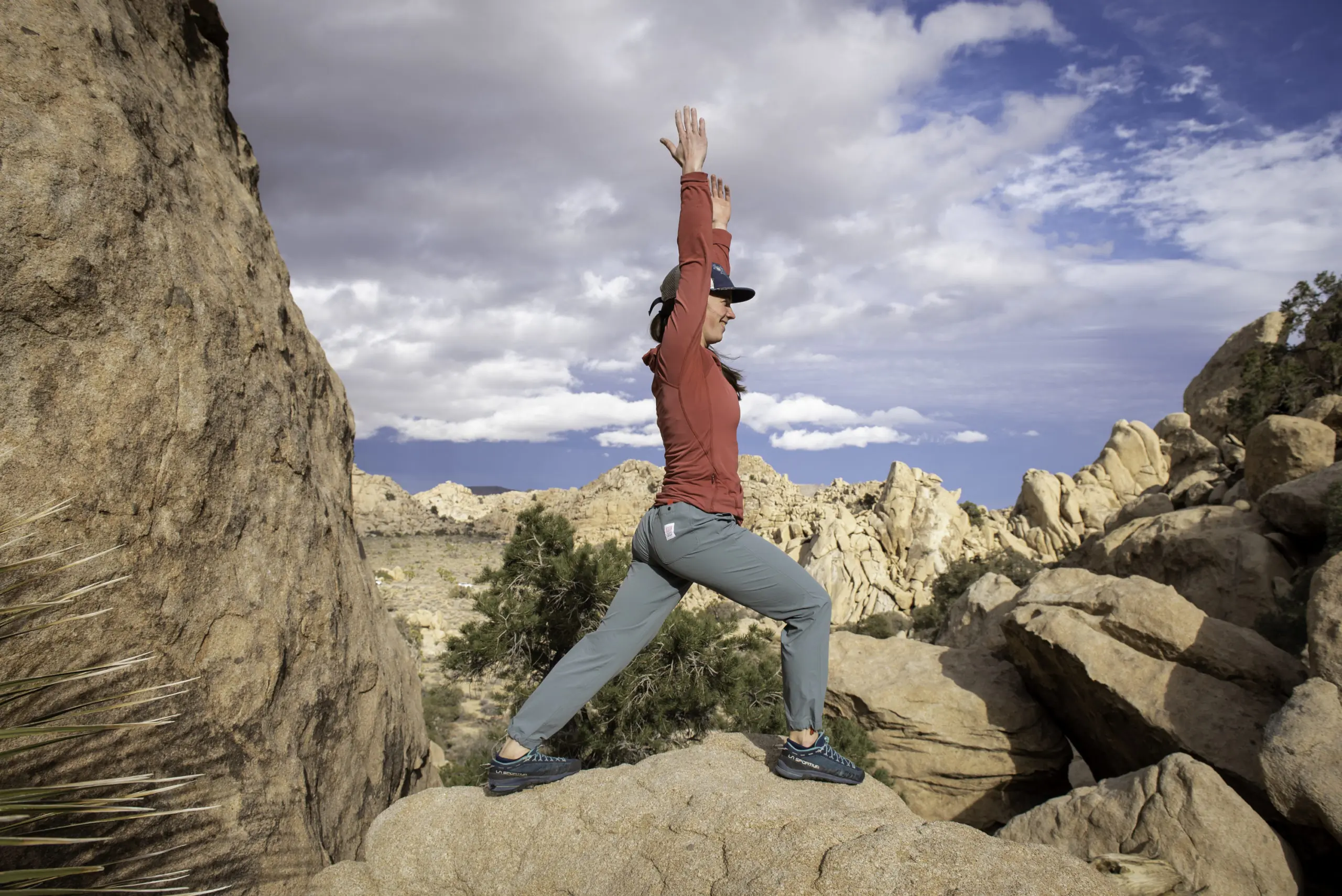



Pockets
Insufficient pockets, or the complete lack thereof, tend to make it on our cons list more than other features on climbing pants. The pockets that tend to work the best are ones that don’t interfere with a harness, are deep enough to be useful, and provide a zipper to ensure that your stuff stays in place while you’re climbing.
A standout in our line of pants is the Patagonia Terravia Alpine Pants. These pants offer zipped flat pockets that don’t interfere with a harness. We also love that the Arc’teryx Gamma Pants only feature zip pockets, ideal for getting high off the ground. If you find yourself climbing indoors or at a local single-pitch crag, you’ll be able to get away with climbing pants that offer a more basic pocket design.
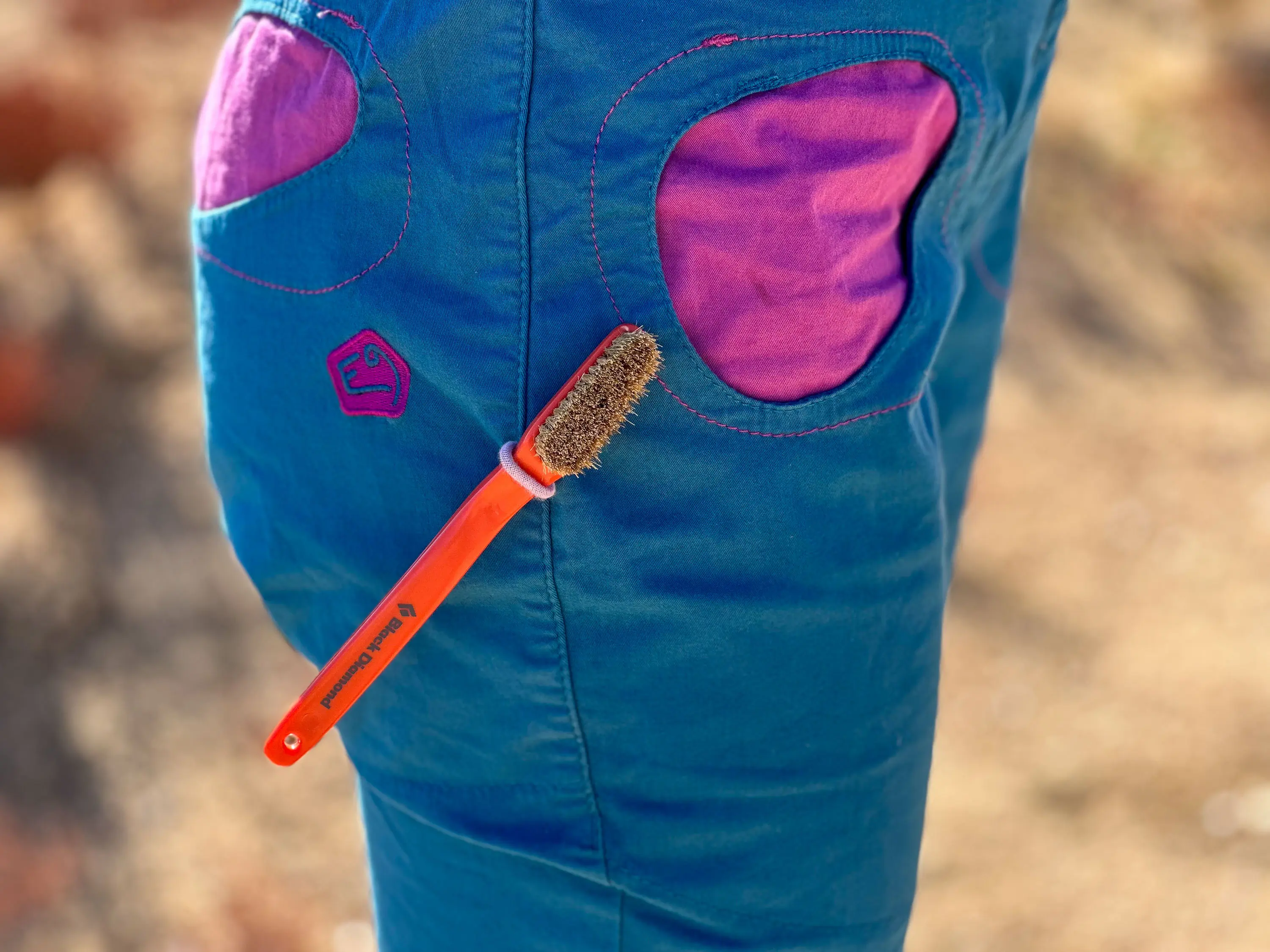



Weight
Generally speaking, the more technical the pant, the more they will weigh because of features that allow them to withstand various elements and terrain. The Patagonia Caliza Rock Pant, for instance, weighs 12 ounces and has several features that make it a durable pant for everyday climbing.
The known lightest on our list is the Patagonia Chambeau Rock Pants, weighing only 7.9 ounces. These pants are breathable and lightweight — perfect for warm-weather excursions. Don’t count out tights for climbing, either, as the Outdoor Research Ad-Vantage Leggings bring supreme flexibility to the table, and sport a tough enough weave to keep going without snags.
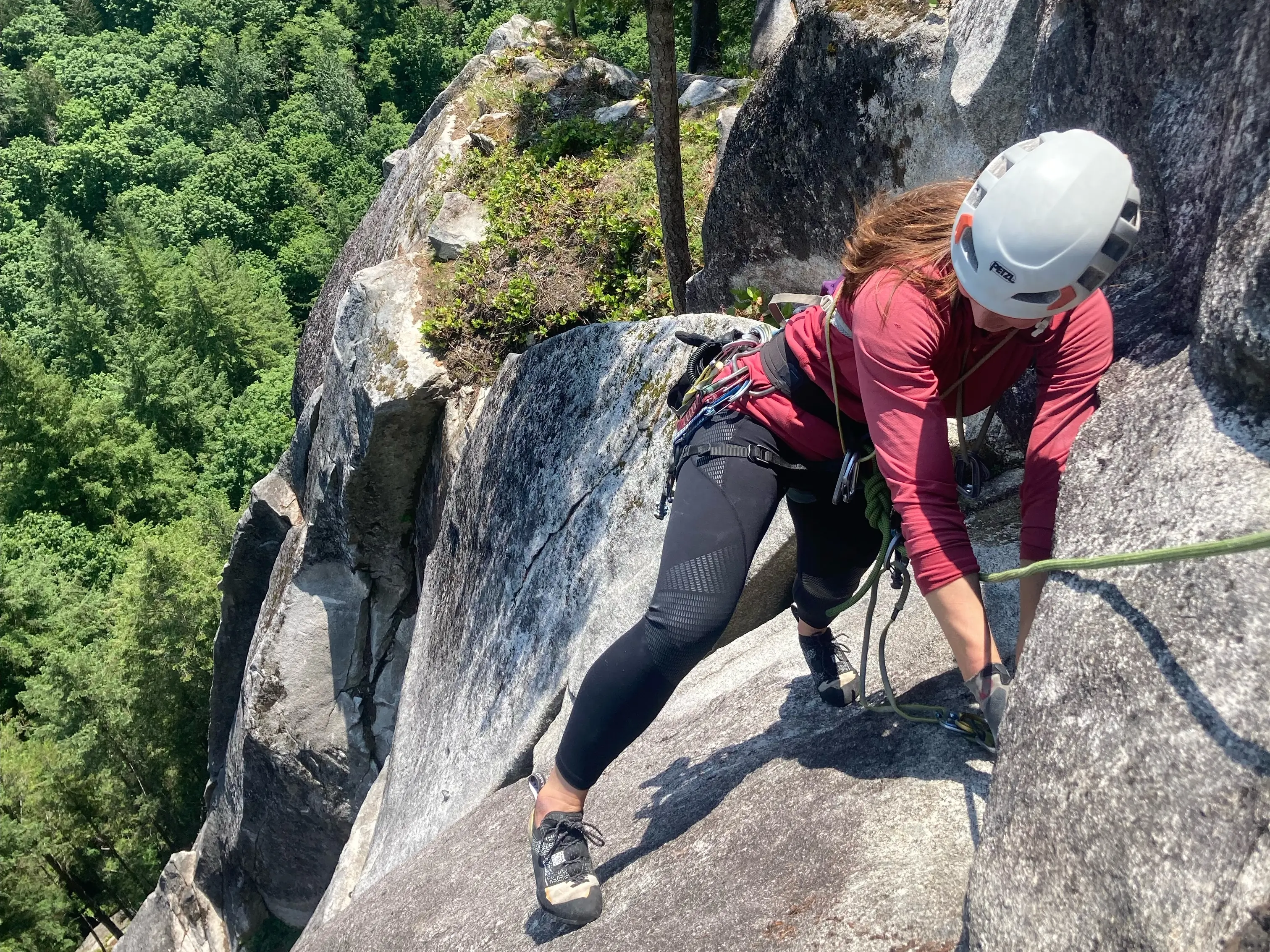



Weather Protection
Some climbing pants are treated with a DWR (Durable Water Repellent) coating. This water-resistant coating helps you stay dry by preventing light precipitation from saturating the fabric. While the DWR won’t protect you from a heavy downpour, it will keep light rain beading off the pants and allow them to dry quickly.
Several pants in our lineup have a DWR finish, including the Topo Designs Mountain Boulder Pants and the Arc’teryx Gamma Pants. This feature is specifically helpful for those conducting long alpine ascents and who may find themselves in unpredictable weather.
It’s important to note special instructions to care for your DWR-treated pants to make the coating last longer. Dirt and oils can impede the coating’s moisture-repelling ability, and frequent washing can help maintain its water-repellency.
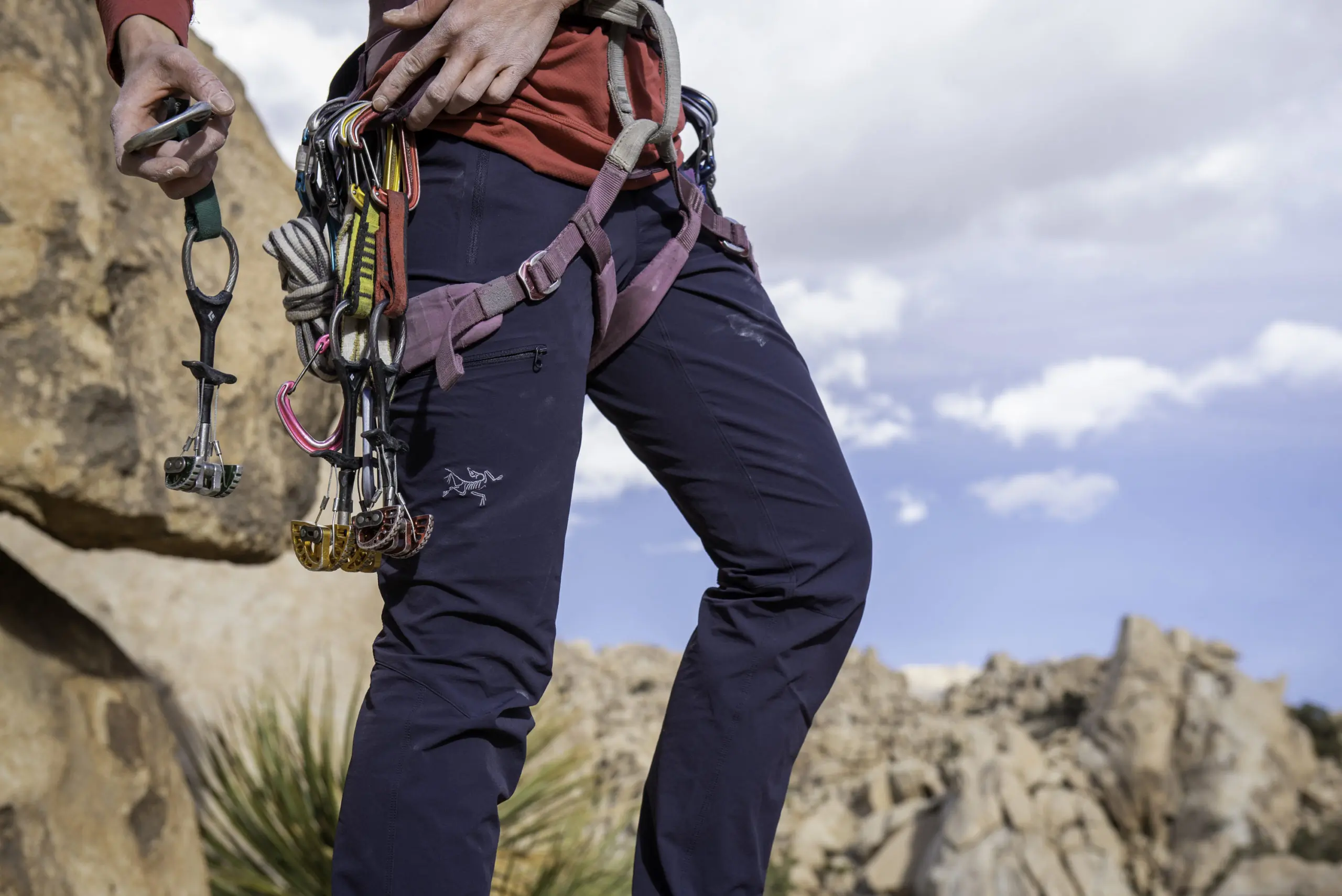



Thickness and Durability
Beyond choosing a silhouette that complements one’s ergonomics, an important component of a pair of pants are that they are durable. They’ll need to withstand walks through abrasive brush, scrambles up and down steep spur trails, grinding against granite, and rubbing against rough sandstone.
For long-lasting pants, look for thicker fabric, an anti-abrasive or abrasive-resistant overlay or material, and reinforced high-wear areas like the knees.
Climbing pants that received our high praise for durability are the Patagonia Caliza Rock Pants and the Arc’teryx Gamma Pants. They withstood beatings against rock and off-trail travel. Although pants designed for rugged use tend to be warmer, so keep that in mind if you climb in hot temperatures.
Articulated Knees and Gussets
A climbing pant’s ability to stretch extensively makes them different from slacks and most everyday jeans. Beyond elastane material, climbing pants are designed to extend the range of motion by having articulated knees and gussets. The gusseted crotch and four-way stretch of the Topo Designs Mountain Boulder Pants makes high stepping a breeze.
Pants with articulated knees will provide the same natural range of motion as a knee while walking and bending. These features are helpful, especially on pants with less elastane that need a boost in flexibility. As for gussets, the diamond-shaped piece of extra fabric sewn in the crotch area make pants more breathable and allows more freedom to move.


Price & Value
You could go climbing in whatever pants you’re wearing, and plenty of climbers climbed in jeans, Carhartts, and painter’s pants back in the day. So why shell out the extra dough for climbing specific pants? Because stretchy materials, an unrestrictive fit, and a few special features go a long way, especially in the mountains. However, there’s no reason to pay top dollar for pants that do more than what you need them for.
Budget
The least expensive climbing pants in our guide are the The North Face Women’s Aphrodite 2.0 Capris ($60). They are the familiar stretchy leggings that are great for a variety of athletic pursuits, and they’re also great for climbing.
If you’re looking for something versatile with less of the “athleisure” look, the Mountain Hardwear Women’s Dynama/2 Ankle ($85) has a looser fit and is made with a thin nylon, making it a good choice for warmer days. Pants in this price range generally lack features like a DWR treatment and zippered pockets, which are useful on longer climbs when weather can be an issue.
Mid-Tier
The meat of our review covers pants in the $90 to $110 range, and there are many excellent choices in this price range. Here, you’ll see pants with 4-way stretch, zippered pockets, and DWR. Our current top choice is the Patagonia Caliza Rock Pant ($109), a stretchy cotton pant that’s awesome for fair-weather climbing all year round.
This tier has some good options for alpine climbers, too, with the fully synthetic Outdoor Research Ferrosi Pants ($99) coming in at a nice price and with a zippered pocket, adjustable cuffs, and 50+ UPF rating. Many of the other pants in this class have gusseted crotches and articulated knees to maximize mobility and further distinguish them from a plain-Jane hiking pant.
Premium
Top dollar ($150+) gets you pants that can stand up to the rigors of alpine climbing, and are generally more durable and weather resistant. The Burly Arc’teryx Gamma Pants ($200) are the most durable pants in this guide and are the best choice for alpine climbing, though they may be overkill for summer cragging. If want a more versatile and cheaper option, the Black Diamond Alpine Pants ($150) are lighter and more breathable but still have 4-way stretch and 3 zippered pockets, similar to the Gamma.
Frequently Asked Questions
The best climbing pants are the ones that make you feel comfortable and allow you to move freely. Our best overall pant is the Patagonia Caliza Pant because they are not overly loose or too tight. They also have a wide elastic waist that’s perfect for a harness and adjustable ankles that can go higher or lower based on preference. Comfort, style, and practicality make these pants excellent for climbing.
It depends. If you are brand new to climbing and testing the sport out for the first time, consider using what you already own — attire you would typically wear to work out. Once you have established that climbing is something you wish to pursue, investing in climbing pants can provide you with unique benefits.
Pant attributes like wide elastic waistbands designed for harnesses, pockets placed for easy access, cuffs that cinch above climbing shoes, and extra material stretch for movement are great assets when climbing regularly.
Most climbing pants offer a range of features that make them multipurpose pants — ideal for walking, hiking, and backpacking. Elements of climbing pants that can apply to hiking are sun protection, DWR, abrasion-resistant material, and functional pockets.
A favorite of ours is the Outdoor Research Ferrosi Pants; their breathable fabric and high UPF rating makes them a great option for hiking. You’ll find us wearing most of the pants on this list beyond rock climbing at the gym and crag.
This can depend on the style of climbing and rock type. When climbing on coarse granite, like the rock found in Joshua Tree or Vedavoo, many climbers prefer to wear pants over shorts, even when it’s hot out. If the style of climbing requires sticking your legs in wide cracks or chimney moves, pants will protect you from scraping your knees.
For sport climbing or bouldering that requires less full-body contact with the rock, shorts can be fine in hot weather. Ultimately, this is a personal preference, and you’ll figure out what you like the more you climb in different areas and conditions.


The Best Women’s Climbing Shoes of 2025
We tested and reviewed the best women’s climbing shoes of 2024, including picks from La Sportiva, SCARPA, and more.
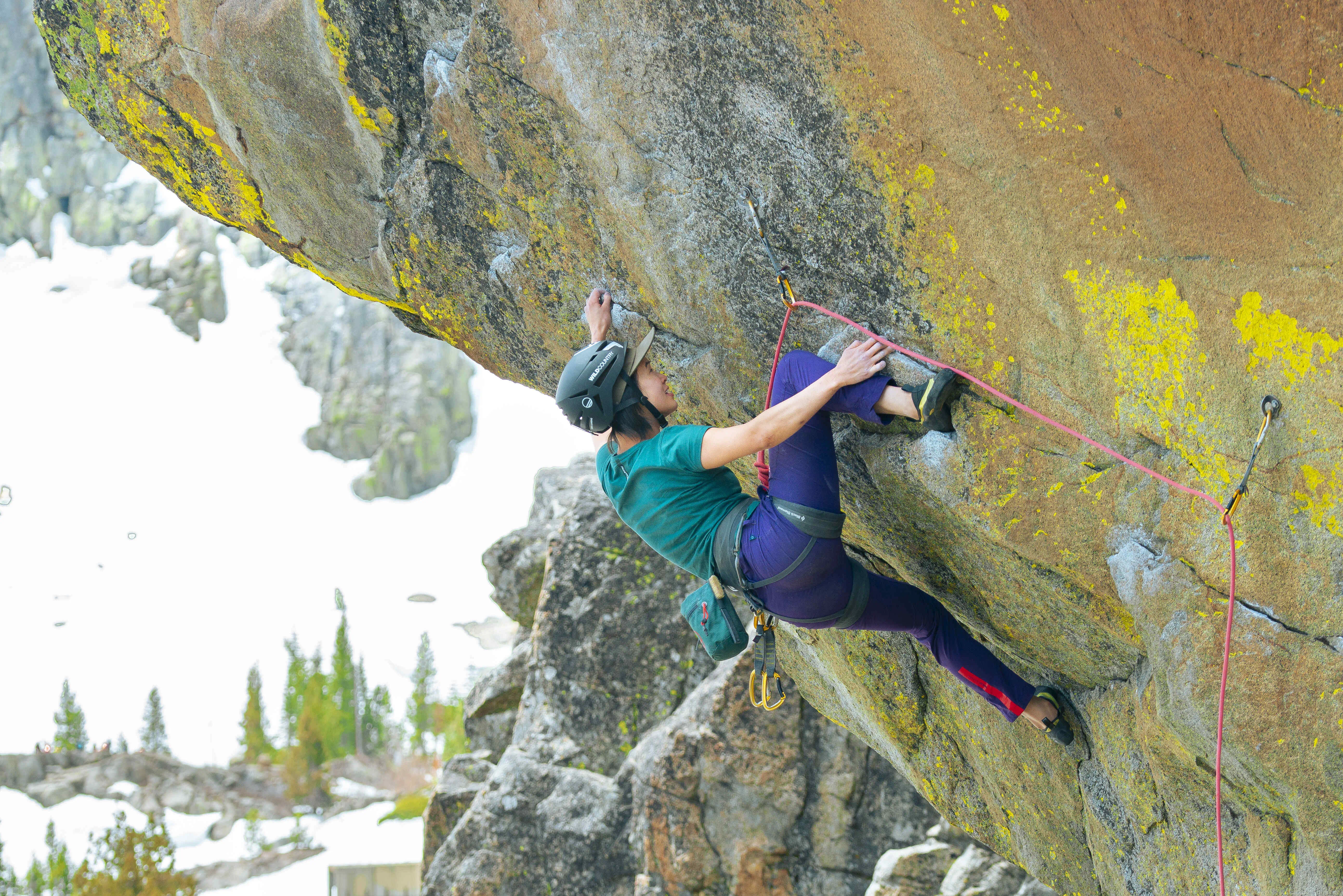

The Best Climbing Harnesses for Women in 2025
We tested and reviewed the best climbing harnesses for women, including top picks from Black Diamond, Petzl, Metolius, and more.
